#問 ━━ answers
Note
The way you write canon characters to not be ooc is insane to me. The way everything flows has me banging my hand against the wall from the sheer beauty of your writing. Is there a process or a trick you do to help understand a character you write? I’ve been having issues writing more complex characters *cough cough* jjk & csm characters *cough cough*. Any advice would be appreciated, thank you for the hard work with all of your fics!
AVOIDING OOC HOW-TO!
omg thank you so much?? i am literally gonna cry because i write character-driven stories more than plot-driven so you saying that makes me feel so good right now i will cry.
but the way i think about it is like, if you're doubting something the character is doing, then you're probably doing it wrong. the most recent chapter of froggie was completely different from what it was supposed to be originally. and the reason for that change is because the characters were entirely very, very much ooc. i hate just thinking about it, ugh.
anyway, i'm not really sure if there's a trick to it? i like to think whether or not the character was originally written in a complex way in the original media, i still write them with the intention of their being complex. but instead of being complex, i think it's more writing them as humans. i honestly don't know. i've always been a socially aware and insecure kid so i pick things up easily, so i might not have the best answer to give you.
but if i really think about it, just consume as much media about them as possible and put yourself in their place in a somewhat of a method acting but not way. whether or not you think they're about to do something bad, just go with it as long as you feel like it's accurate. or, you can write them in a way you don't actually write their character.
for example, in my among dawn flowers (the face of god), we see gojō from the perspective of the main character so how the main character describes gojō might not exactly be how gojō actually is but just a surface-level observation from the character. the main character might see gojō doing this for what she thinks is because of that, but in gojō's head, he's doing it because of a different reason. keeping a character from a distance helps a lot and making your character overthink their character also adds some psychological spice that makes the story look more complex and interesting.
but if you want it to be more ingrained in the character's perspective like what i did in sunday without god where it's entirely in nanami's pov, make him focus on what you already know: aka your character. make your character do this and that but don't write in a way that you're leading specifically what you want to happen. i think the hard thing about writing fanfics is that the characters you're writing aren't yours. that's why instead of usually leading up to what you want to happen, you're going to use what the character would realistically do then adjust your story to their decisions.
you can't really just choose to write a canon character in a way that serves you because that would just end up OOC. writing fanfiction, in my opinion, is adjusting to what the canon character would do while maintaining the essence of your plot.
but if you're writing strictly canon characters with no interactions with OCs, then all i can say is yes, consume as much media about them and it might not be a nice advise, but restrict yourself. the character isn't yours so you can't just go running off and make up things that aren't really true. consider it in a behavioralist perspective: with every action you have to consider their past, present, and future, most especially the past and their backstories because backstories always affect present actions and future aftermaths.
IN SUMMARY:
treat them as humans and not just as one-dimensional characters!
if you're really struggling to write the character, don't write them! write around them through keeping it from an outside perspective from a character you know or make the canon character react to a character you know / something you're familiar with.
consume as much media, read fics that you like and do not like about them and figure out why you think so!
that's all i could think of hehehe <3
according to my friend whom i also asked in passing: "writing a canon character is already considered personal interpretation." and i was like ooh? that's true.
41 notes
·
View notes
Note
(日本語ネイティブスピーカーじゃありません)
みなみさんの作品がかわいくてずっと大好きです!
前twitterで連載した「なぜ君は私を見下すようになったのか」の続きがずっっっっと気になって、本当に見たかった、その続きはこれからいますか?
それともハミルトンにはもう興味ないからもう続きはありませんか?
プレシャーかけるつもりはないです!でも別の聞き方はわからないなので、無礼なところとお邪魔したこと、お先にすみませんでした。
質問ありがとうございます!
漫画見てくださって嬉しいです。
「なぜ君は私を見下すようになったのか」はずっと続きを描こうとは思っているのですが、描いている時も世界観を満足に表現するのが難しく、なかなか描き進めることができなかったのです。史実のハミルトンとバーのいざこざも参考にしたいと思っていたのが原因かもしれません。
しかしまだ物語を完結させたい気持ちはあります。ハミルトンもずっと好きです😊更新した時はまたgoogoominamiの方のTumblr やpoipikuでお知らせするので、その時は見ていただけると嬉しいです。
2 notes
·
View notes
Note
Oi! -- Are you prepared to admit that my jokes are gold, yet, Captain Kuchiki?
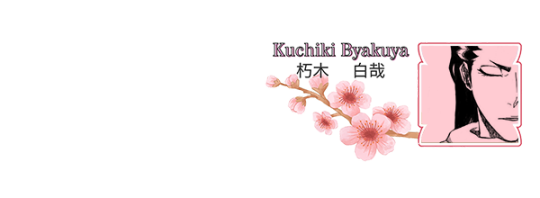
" Some people do perceive fool's gold as the real thing and live on without ever truly knowing the difference. I, however, am not one of those individuals, Captain Hitsugaya Toshiro. "

5 notes
·
View notes
Text
"Tenma, boss of the tengu". Exploring the "heavenly demon(s)"

The identity of Tenma, the leader of tengu in Touhou, remains a mystery. I think only ZUN can solve it - if he ever chooses to, obviously. Therefore, this is not quite an article meant to prove I figured out who Tenma is. Instead, it presents the origin of this name, and introduces a handful of figures in various contexts portrayed as leaders of the tengu who I think would be interesting candidates for the position of Tenma.
My additional goal is to show that even though popculture tends to portray all tengu as basically interchangeable, there is actually a fair share of unique tales about specific named members of this category. Corrupt monks! Vengeful spirits! Visitors from far off lands! There’s even a sea monster converted to Buddhism! Obviously, this isn’t supposed to be a list of every single named tengu and every single story. It’s not even a list of all of my favorite tengu. It’s simply an attempt at convincing you that digging deeper into tengu background is worth it - and in particular that there is still a lot to speculate about when it comes to their leader in Touhou. It’s some of the best oc free real estate in the series, really.
Due to technical difficulties, the bibliography is included as a Google Docs link rather than a part of the article. I'm sorry.
From Mara to tengu: the development of the concept of tenma
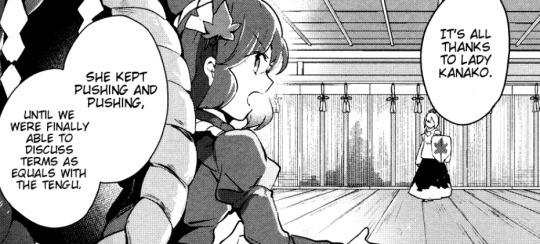
Silhouette of a tengu negotiating with Kanako in WaHH 38, sometimes labeled as Tenma on fan sites through debatable exegesis.
As we originally learned in Perfect Memento in Strict Sense, Gensokyo’s tengu are ruled by an individual named Tenma (天魔). Akyuu simply describes them as the “tengu’s boss” and provides no further information. While some additional tidbits have since surfaced here and there, they largely remain a mystery. Next to Chang’e, the unseen fourth deva of the mountain and the fourth Beast Realm figurehead they’re easily the highest profile unseen character in the entire series.
While in absence of information on the contrary we cannot necessarily assume that Tenma isn’t a given name in Touhou, ZUN did not actually come up with this term. It has been a significant part of tengu background at least since the Kamakura period. It can be translated as “heavenly demon”, and it’s a shortened form of Dairokuten Maō (第六天魔王), “Demon King of Sixth Heaven”, the Japanese name of Mara. Tenma is explained as a synonym of Mara’s “personal name” Hajun (波旬; Sanskrit Pāpīyas) for instance in the treatise Makashikan (摩訶止観; translation of Chinese Móhē Zhǐguān, “Great Cessation and Insight”).
Is that all there is to the mystery of Tenma? For what it’s worth, a possible reference to the full form of Mara’s name can be found in a description of Okina’s ability card in Unconnected Marketeers, which mentions “Tenma living in paradise”. I don’t think this is very strong evidence, though.
Touhou aside, it is hard to deny tengu are fundamentally tied to Mara. They are directly described as his subjects in Buddhist works such as Soseki Musō’s (1275–1351) Muchū mondō (夢中問答集; “Questions and Answers in Dreams”) and Unshō’s (運敞; 1614–1693) Jakushōdō Kokkyōshū (寂照堂谷響集). However, it needs to be stressed that a being referred to as Tenma does not necessarily have to be Mara himself.
A plurality of Maras theoretically became possible as soon as the belief this name didn’t designate an individual, but rather a position which could be held by various individuals or a category of beings developed in Buddhism. The former idea already appears in the Māratajjanīya, a part of the Theravada Buddhist Majjhima Nikāya, dated to the late first millennium BCE or early first millennium CE. Maudgalyāyana, one of the disciples of the historical Buddha, reveals in it that he was (a) Mara in a past life, and thus can easily notice the presence of the present Mara. The shift from a singular Mara (魔, mo) to an assortment of “demon kings” (魔王, mowang) is also well documented in early Buddhist sources from China.
As a curiosity it’s worth noting that even though the terms mo and mowang originally referred to strictly Buddhist demons, they were also incorporated into Daoist traditions, especially Lingbao and Shangqing. For example the former school's central text Duren Jing (度人經; “Scripture for Universal Salvation”) maintains that multiple mowang exist.
While some of these “demon kings” are tempters not too dissimilar from their Buddhist forerunner (though what they obstruct is attaining the distinctly Daoist form of transcendence - in other words, immortality), others are portrayed as judges responsible for determining the fates of people in the afterlife. In later sources the term mo sometimes also refers to supernatural pathogens (generally 邪, xie or 邪氣, xiequi).

Sun Wukong and his fellow pilgrims battling the Bull Demon King on a mural from the Summer Palace in Beijing (wikimedia commons)
You don’t really need to look for any particularly obscure sources to see this transformation of Mara into a generic moniker, though - even the Bull Demon King from Journey to the West has the compound 魔王 in his name. Same goes for numerous other antagonists from this work.
When it comes to Japanese sources, it also doesn’t require looking for anything particularly obscure to find evidence in the belief in multiplicity of ma or tenma.
In the historical epic Heike Monogatari, emperor Go-Shirakawa implores Sumiyoshi Daimyōjin to explain the nature of tenma to him. He reveals that this term refers to monks and scholars who, despite nominally following Buddhism, lacked the mindset needed to attain enlightenment. He compares them to birds of prey, but also states they belong to the “dog species”. All of these are nods to well established beliefs about tengu, which I discussed in my previous article, with a reference to the writing of their name on top of that.
It comes as no surprise that right after that Sumiyoshi Daimyōjin specifies that “the wise men of the eight sects who become tenma are called tengu”. He also makes it clear the tenma are quite numerous: “nine out of ten will definitely become tenma and try to destroy the Law of Buddha,” he warns.
A plurality of tenma can also be found in assorted biographies of pious Buddhist reborn in a pure land, so-called ōjōden (往生伝). The Tendai treatise Asabashō (阿娑縛抄) attributes the ability to “subdue all tenma” - evidently a class of beings, not an individual - to Fudō Myōō.
Through the rest of the article, I will introduce some of these tenma - the most famous tengu. My goal is not to convince you that any of them is a uniquely plausible candidate for the role of the unseen Touhou Tenma - I merely would like to point out there are multiple interesting options.
The oneness of vice and virtue: Ryōgen, the ruler of Makai
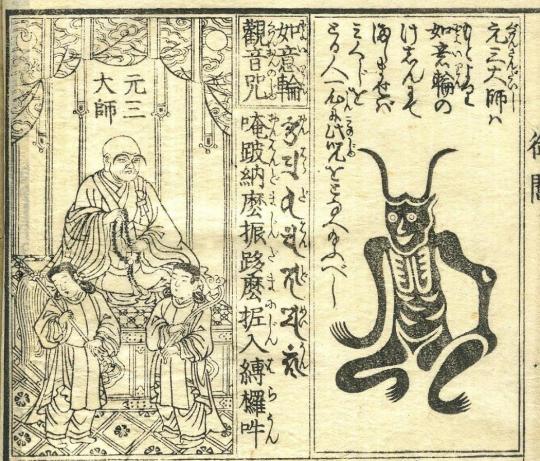
The historical Ryōgen (left) and his deomic alter ego Tsuno Daishi (wikimedia commons)
Before Ryōgen (912–985) came to be seen as a tengu, he was one of the most influential members of the Tendai school of Buddhism to ever live. He reformed the Enryaku-ji complex on Mt. Hiei, took part in numerous theological debates, and gained the favor of the imperial court by supposedly enabling the birth of an heir of emperor Murakami with his prayers. He was also renowned as a master of esoteric protective rituals.
The proponents of the Tendai establishment understood him as a fearsome protector of this tradition. As early as 50 years after his death, in the 1030s, he came to be identified as the reincarnation of Tendai’s founder Saichō. He was also considered a manifestation of one of the eight dragon kings, Uhatsura (優鉢羅; from Sanskrit Utpalaka). Ōe no Masafusa states that in this form he continued to protect Mt. Hiei, instead of being reborn in a pure land. This idea continued to spread, and by the end of the Kamakura period he came to be commonly revered as a protective figure by all strata of society. Haruko Wakabayashi notes that only Kūkai developed a similar cult in Japan as far as patriarchs of the esoteric Buddhist schools go.
It was not Ryōgen’s ability to navigate complex doctrinal debates about the interpretation of sutras that resulted in his popularity, but rather his esoteric skills. He was supposedly uniquely accomplished when it came to subduing anything which could be described as ma. In a Konjaku Monogatari tale I’ll discuss in more detail later, he effortlessly overcomes a tengu, for instance.
However, in addition to spiritual obstacles and demons, the ma he was supposed to conquer also included political opponents, rebels or brigands, as the Buddhist law and the interests of the state were understood as identical. Ryōgen’s efficiency was so great he came to be viewed as a manifestation of Fudo Myōō, one of the wisdom kings and the conqueror of ma par excellence.
Not everyone viewed Ryōgen positively, though. The earliest criticism came from his contemporaries. It was argued that he favored monks from aristocratic families, and that he lived in luxury unbefitting for a monk. Furthermore, numerous conflicts between monks erupted during his tenure as Enryakuji’s abbot, including the split between the Sanmon and Jimon lineages. Since in some cases this led to armed confrontations, later on he was blamed for essentially enabling the rise of militarized monks who commonly caused disturbances on Mt. Hiei.
The real breakthroughs were not these tangible “political” criticisms. Rather, it was the identification of Ryōgen as ma, which arose due to conflict between various schools of Buddhism in the early middle ages. Most commonly this meant portraying him as a tengu - as I explained in my previous article, the form arrogant or corrupt monks were believed to take. A variant tradition described him as an oni, though according to Bernard Faure this likely simply reflects a degree of interchangeability between them and tengu.
Ryōgen is arguably the most famous historical monk to be furnished with such a literary afterlife. An early example can be found in the Hōbutsushū from the twelfth century, which states that this was a result of his attachment to Enryaku-ji. In Jimon Kōsōki (寺門高僧記) it is instead his investment in doctrinal debates that made him unable to attain rebirth in a pure land.

A gathering of tengu leaders from Tengu Zōshi (wikimedia commons)
Since Ryōgen was no ordinary monk, his tengu self also had to be special. In the Tengu Zōshi (天狗草紙), he is described as the ruler of all tengu and the realm they inhabit, Makai (“world of ma”; also referred to as Tengudō). It's worth pointing out the notion of Makai being a place where monks turn into specific classes of supernatural beings is basically a core part of UFO’s plot, and in SoPM Miko even wonders if Byakuren shouldn’t be considered a tengu.
As a ruler of Makai, Ryōgen came to be referred to as a “demon king”, maō (魔王). An example can be found in the historical epic Taiheiki, where he is described as one of the “great demon kings” (大魔王, daimaō) who debate how to cause chaos in Japan. He is assisted by vengeful spirits of the emperors Sutoku (more on him later), Go-Toba and Go-Daigo; two members of the Minamoto clan who sided with Sutoku, Tameyoshi and Tametomo; and the monks Genbō, Shinzei (真済, 800-860; obscure today, but apparently well known as a monk turned tengu in the middle ages) and Raigō (who supposedly turned into the infamous “iron rat”).
In Hirasan Kojin Reitaku (比良山古人霊託; “The Spiritual Oracle of the Old Man of Mount Hira”) this is only a temporary fate, though: supposed by the time this work was compiled, he already managed to leave Tengudō. As I discussed last month, this reflects a fairly standard belief too: to become a tengu, one had to actually be a Buddhist, and while it made striving for enlightenment more difficult, it did not mean eternal damnation or anything of that sort. A tengu could still choose to pursue rebirth in a pure land - it was just more difficult than for a human.
The evolution of Ryōgen’s image didn’t end with the establishment of his new role as a king of tengu, or even with the arguments that he might have nonetheless subsequently attained enlightenment. By the end of the Kamakura period, he came to be worshiped explicitly in the form of a “demon king”. While initially polemical, this image of him came to be subverted by Tendai monks to their own ends. They asserted that Ryōgen did not enter the realm of ma because of his arrogance, but rather consciously chose to do so in order to protect Buddhist principles. By becoming the ruler of its inhabitants, he also became their ultimate conqueror.
The notion of a being who is simultaneously essentially Mara-like and a protector of Buddhism seems contradictory. That’s actually the intent here. Through the middle ages, the esoteric schools of Buddhism developed the notion of hongaku, or “original enlightenment”. In its light, opposites were in fact identical. Buddha was the same as Mara (魔仏一如, mabutsu ichinyo). As it was argued, to attain Buddha nature one had to understand and experience delusion as well. Thus virtuous individuals could become demon kings in order to freely control evil beings.
In addition to its deep philosophical implications, the hongaku theory was also used to reject criticisms of the Buddhist establishment. Enjoying luxuries was but a way to better understand delusion, and thus to advance along the path to enlightenment. Its proponents embraced some criticisms of Ryōgen: he did favor nobles, accumulate wealth and live arrogantly. He did become a powerful tengu. But all of this was in fact part of a noble goal. And on top of that, as a demon king he was an even more fearsome protector of Tendai than he would be otherwise.
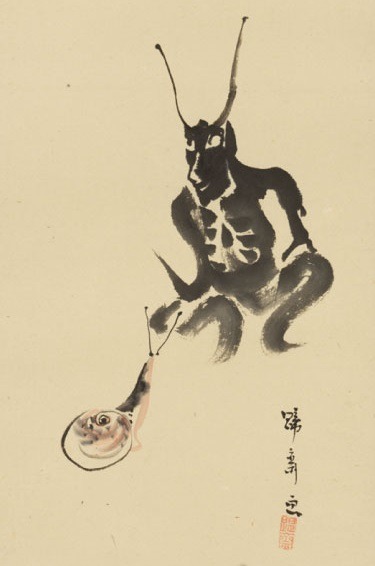
"Tsuno Daishi and a snail" by Teisai Hokuba (Sumida Hokusai Museum; reproduced here for educational purposes only)
The new role of Ryōgen warranted new iconography. While formerly portrayed simply as a monk holding the expected priestly attributes, in the Kamakura period he came to be depicted as Tsuno Daishi (角大師), the “Horned Master”. This image spread far and wide due to the development of a belief that hanging depictions of Ryōgen would guarantee the same protection Tendai institutions received from him. He came to be seen as particularly efficient in warding off disease.
Many temples still distribute talismans depicting Tsuno Daishi today. This custom received a lot of press coverage in the early months of the COVID pandemic, and you might have seen some examples on social media.
From vengeful spirit to tengu: the case of emperor Sutoku
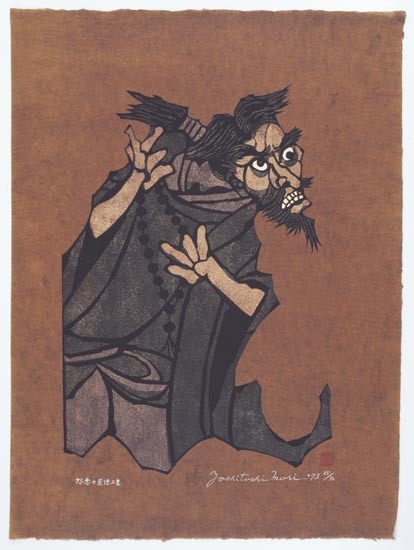
Sutoku, as depicted by Yoshitoshi Mori (Tokyo's National Museum of Modern Art; reproduced here for educational purposes only)
Sutoku has much in common with Ryōgen - he was also a historical figure who purportedly became a tengu. However, he was not a monk, but rather an emperor. He reigned from 1123 to 1142, when he was forced to abdicate in favor of his half brother Konoe.
Konoe passed away in 1155, but Sutoku was not allowed to return to the throne. It was instead claimed by another half brother, Go-Shirakawa. Sutoku decided that’s enough half brothers seizing a position he believed was still rightfully his, and plotted an uprising. This culminated in the Hōgen Disturbance of 1156. Alas, planning seemingly wasn’t his strong suit, since the conflict was essentially resolved before it even started. Go-Shirakawa’s forces defeated Sutoku’s before they even left their encampment.

Sutoku as a vengeful spirit, as depicted by Kuniyoshi Utagawa (wikimedia commons)
In the aftermath of his failed rebellion, Sutoku was exiled to Sanuki, where he eventually passed away in 1164. However, his memory lingered on. He most likely came to be widely perceived as a vengeful spirit after the great fire of Angen broke out in Kyoto in 1177. Other subsequent disasters, including the Genpei war (1180-1185) and the 1181 famine, strengthened the belief that he was punishing his enemies from behind the grave. However, he didn’t become just any vengeful ghost, but one of the three greatest members of this category ever, next to Sugawara no Michizane and Taira no Masakado.
Sutoku was, in a way, the sum of many of the greatest fears of medieval Japan. The belief in his rebirth as a vengeful ghost coexisted with a tradition presenting him as a tengu - arguably one of the greatest tengu ever. This status is firmly ingrained into his image in later sources. Today he is frequently included in modern groupings of “three great youkai” alongside Shuten Dōji and Tamamo no Mae. It seems sometimes he’s replaced by Ōtakemaru, but honestly I think he is more worthy of this spot, and also even though this is ultimately a synthetic modern group, it’s much more representative of medieval culture to have a tengu alongside an oni and a fox.

A strikingly tengu-like vengeful Sutoku, as depicted by Yoshitsuya Utagawa (wikimedia commons)
While peculiar, Sutoku’s dual role as a tengu and a vengeful spirit is not entirely unique. Initially these two categories were pretty firmly separate. Tengu obstructed attaining enlightenment and rebirth in a pure land; vengeful ghosts, as their name indicates, were focused on personal vengeance. However, in popular imagination they overlapped, as evident for example in members of both groups scheming together in the Taiheiki. This most likely reflects the overlap between the perception of enemies of Buddhism and enemies of the state. Vengeful ghosts were typically members of factions who lost one political struggle or another, and their vengeance was aimed at the establishment.
Regardless of Sutoku’s supernatural taxonomic position, his post-mortem fate is tied to the fact he was a devout Buddhist. All accounts of his exile stress that he spent much of his time copying sutras. According to a rumor first attested in 1183, he also wrote a curse on their backs using his own blood, vowing to become a “demon king” - (a) Mara - due to perceived injustice he faced. There is no evidence it’s based on a historical event, even though it’s not impossible Go-Shirakawa did believe in it. At the very least, he definitely saw the deceased Sutoku as a supernatural threat, as he had various ceremonies performed in hopes of pacifying him.
Hōgen Monogatari, composed in the early fourteenth century, asserts that he became a tengu while he was still alive. When his request to deposit the completed manuscripts in a temple in Kyoto was denied by Go-Shirakawa, he vowed to remain his enemy in future lives, and stopped cutting his nails and hair. This symbolically marked his transformation. However, a former emperor couldn’t just become any tengu. Therefore, for instance in the Taiheiki he is described as a leader of the tengu, and his bird form is that of a golden kite.
Up to 2022, the Touhou wiki used to claim that “among Touhou fans, it is almost a general idea that the Tenma is inspired by Grand Emperor Sutoku” (not sure what is the “grand” doing here, there’s no such a title as daitennō as far as I am aware, but I digress), as you can see here. I will admit I’ve never encountered this headcanon - you will generally be hard pressed to find Touhou headcanons relying on actual mythology that aren’t just some variety of power level wank or otherwise all around awkward - so I think removing it was the right move (I don’t think the replacement is any better considering Mara is not a “Hindi god” - Hindi is a language, not a religion - but that’s another problem).
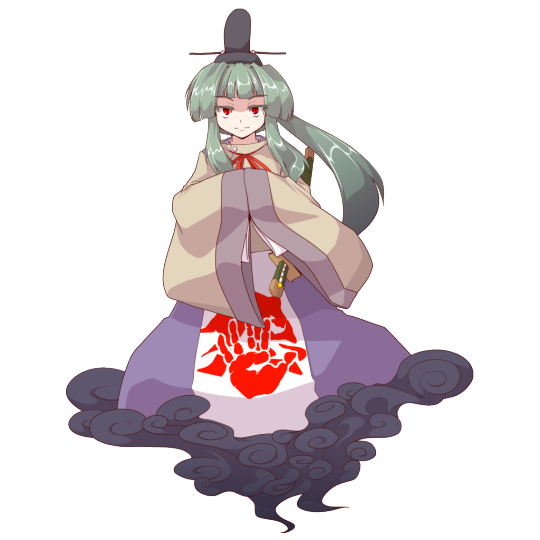
I’m also not aware of any Sutoku fan characters save for Tenmu Sutokuin from the fangame Mystical Power Plant who isn’t even supposed to be a take on the canon Tenma. Design-wise she clearly leans more into the vengeful spirit side of things (to the point the design would work better as Michizane than Sutoku, really, though I don’t dislike it). The filename on the wiki misspells her name as Tenma, but I have no clue whether this has anything to do with the strange headcanon assertion from the Tenma article. The closest thing to a Tenma reference she gets is a spell card referencing the sixth heaven, but the game refers to her merely as a “great tengu”.
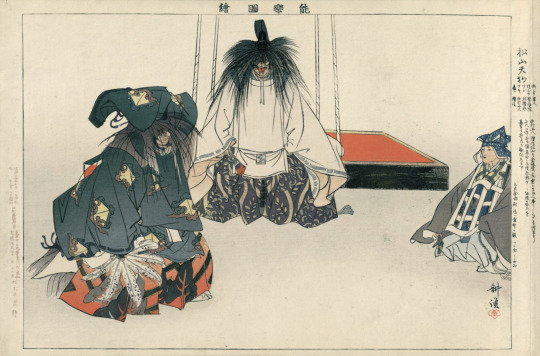
Kōgyo Tsukioka's illustration of a performance of Matsuyama Tengu, with actors playing Saigyō, Sutoku and another tengu (wikimedia commons)
MPP aside, there's a lot of room for Sutoku in Touhou. The poet-monk Saigyō, whose life and works served as a loose inspiration for the plot of Perfect Cherry Blossom and Yuyuko’s character, went on a journey through locations associated with the late ex-emperor four years after his death, in 1168. He felt a personal connection to him because before being ordained he served as a guard of the imperial palace during his reign. This unconventional pilgrimage to at the time peripheral, sparsely inhabited areas was both a form of paying respect to his former superior, and possibly a way to pacify his vengeful spirit.
Saigyō obviously did not meet the deceased Sutoku, and ultimately only two of his poems deal with his downfall. However, later legends kept expanding upon their connection. This eventually culminated in the development of a tale according to which the monk in fact encountered Sutoku in the form of either a vengeful spirit or a tengu. The noh play Matsuyama Tengu is based on it. Its title is derived from the name Sutoku’s first residence after his exile. As a curiosity it’s worth pointing out the play singles out Sagamibō (相模坊), the tengu of Mt. Shiramine, as an ally of Sutoku - an ideal candidate for a stage 5 sidekick, if you ask me.
Some further interesting developments regarding Sutoku’s tengu identity took place in the Edo period, but I’ll discuss them in a separate section later.
The other tengu emperor: Go-Shirakawa
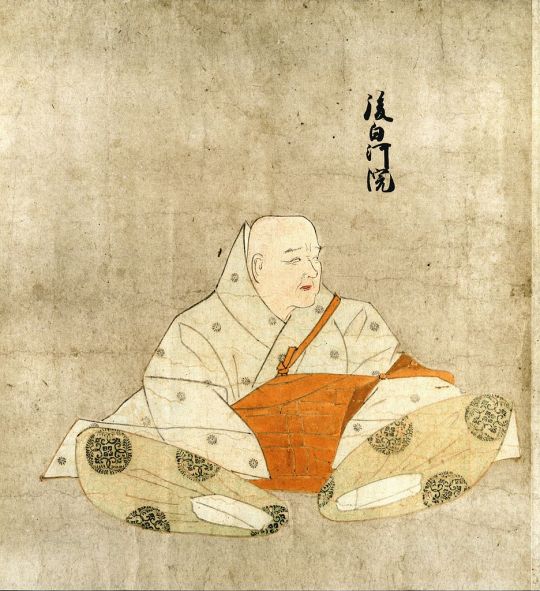
A portrait of Go-Shirakawa (wikimedia commons)
While Sutoku’s opposition to Go-Shirakawa essentially was the first step to the development of the belief he was a tengu, the latter also came to be viewed as a member of this category. While still alive, no less. One of the first sources to identify him as a tengu is a letter of his contemporary Minamoto no Yoritomo. He refers to the emperor as the “greatest tengu of all Japan” because of his notoriously fickle political positions. He at one point approved Minamoto no Yoshitsune’s plan to suppress Yoritomo, just to reverse this decision and declare Yoshitsune is acting on behalf of a tenma.
The notion of Go-Shirakawa being a tengu is present in the Heike Monogatari as well. In the scene I already mentioned, Sumiyoshi informs Go-Shirakawa that extensively studying Buddhist texts made him arrogant, and that he’s already attracting the attention of tengu. It is just a matter of time until he will be reborn as one of them himself. Stressing his religiosity is meant to show how it is possible for him to become a tengu in the same manner as monks.
Go-Shirakawa’s tengu career arguably peaked with his portrayal in Hirasan Kojin Reitaku. It states that both him and Sutoku became tengu, but it is the former whose “power is beyond comparison”. However, he plays no bigger role in the narrative, and he’s not described as a leader of the tengu, or even as the most powerful of them. In the absence of Ryōgen, it is apparently his contemporary Yokei (余慶; 919-991) who became the most powerful tengu. Go-Shirakawa doesn’t even get to be the second most powerful - that’s apparently Zōyo (増誉; 1032–1116). As far as I am aware, no distinct legends about these monks becoming tengu exist, so much like the elevated position of Go-Shirakawa this seems like a peculiarity of Hirasan Kojin Reitaku.

Early twentienth centiury depiction of a typical shirabyōshi costume (wikimedia commons)
While Go-Shirakawa doesn’t appear in any particularly significant pieces of tengu literature otherwise, his personal quirks are responsible for a somewhat obscure aspect of tengu background. A further detail revealed in the Hirasan Kojin Reitaku is that tengu are connoisseurs of all sorts of performances, but enjoy the dances of shirabyōshi in particular. know, I brought this up already in the previous article, but I think it’s a fun detail. Think of the sheer potential of a tengu shirabyōshi character (whether in Touhou context or elsewhere), also.
From celebrated saint to reviled tengu and back again: Ippen

A statue of Ippen from Hōgon-ji, apparently destroyed in a fire in 2013 (wikimedia commons)
Ippen is here more as a curiosity than anything, since he isn’t really a mainstay of tengu literature. Like Ryōgen and the two emperors-turned-tengu, he was a historical figure. He lived from 1238 to 1289 and founded the Jishū school of Pure Land Buddhism. He spent much of his life as a wandering preacher, advocating a unique form of nenbutsu (chanting the name of Amida), the self-explanatory nenbutsu dance (念仏踊り, nenbutsu-odori).
Legends assert that various miracles occurred thanks to Ippen’s devotion. For instance, at one point the nenbutsu dance he initiated made flowers fall from the sky. On another occasion, purple clouds appeared above him. Stories of his various miraculous deeds were retold in the form of picture scrolls, such as Ippen Hijiri-e (一遍 聖 絵; “The Illustrated Biography of Ippen”).
Ippen’s activity, in particular the dance he promoted, was evidently controversial among his contemporaries. Tengu Zōshi refers to him as the “chief tengu”, and portrays the practices he spread negatively. An entire explanatory paragraph is devoted to stressing the disruptive character of nenbutsu he promoted. Alongside other unorthodox behaviors it is blamed for various social ills including the fall of the Song dynasty in China (sic).
The opposition of other Buddhist schools to certain early currents within the Pure Land movement was often rooted in the rejection of the worship of deities and even Buddhas other than Amida. Of course, today it’s not hard to find people incorrectly convinced Buddhism is a “religion without gods” (this is a phenomenon so widespread it was actually considered a major obstacle by researchers of the history of Buddhism). However, through the middle ages devas, kami, Onmyōdō calendar deities and various figures like Dakiniten or Matarajin who defy classification altogether were anything but marginal in most schools of Buddhism in Japan. Oaths were sworn by Taishakuten and his entourage, Enmaten and Taizan Fukun were invoked in popular rites meant to guarantee good fortune, and so on.
Interestingly, Tengu Zōshi does not deny that miracles attributed to Ippen really happened. In fact, they are even depicted in the illustrations. However, the reader is expected to realize they are implicitly not a genuine display of Buddhist holiness, but merely a tengu trick meant to lead people astray. This is essentially a twist on stories already common in the Heian period, something like the tengu pretending to be a Buddha in a famous story from the Konjaku Monogatari adapted to reflect the anxieties of the Kamakura period tied to new religious movements.
The condemnation of Ippen goes further than merely implying his miracles were trickery, though. While in the final section of the scroll it is revealed that with enough effort even a tengu can attain buddhahood, Ippen is singled out as incapable of that. He is destined to fall even further from grace and to be reborn in the realm of beasts.
Despite the circulation of such negative opinions about Ippen among his contemporaries, Jishū school ultimately survived past the Kamakura period, and it still exists today.
Tengu caught between history and fiction: Tarōbō
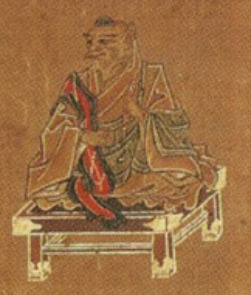
Tarōbō in a mandala from Mt. Atago (via Patricia Yamada's Bodhisattva as Warrior God; reproduced here for educational purposes only)
Tarōbō (太郎坊) is the tengu of Mount Atago. This location’s association with the tengu is well attested, and for instance in Hirasan Kojin Reitaku multiple of them are said to reside there, including Yokei, Zōyo and Jien.
However, Tarōbō is not identical with any of these historical monks. He’s an interesting case because it would appear he stands exactly on the border between historical figures and literary characters. One of the first attestations of him, if not the first one outright, has been identified in the Tengu Zōshi. On an illustration showing a gathering of tengu leaders, who are mostly identified by the names of schools of Buddhism they represent, one is instead given a specific name, Atago Tarōbō (愛石護太郎房). His notoriety continued to grow in later sources: Taiheiki presents him as a well known tengu, while Heike Monogatari outright labels him the “greatest tengu in all of Japan”.
While Tengu Zōshi and other early sources don’t provide any information about Tarōbō’s origin, in later tradition he came to be identified with the legendary Korean monk Nichira (日羅). His name would be read as Illa following the Hanja sign values, and at least some authors prefer using this reading or list both. I’m sticking to Nichira here, to maintain consistency with a name sometimes used to refer to his tengu form, Nichirabō (日羅坊; “the monk Nichira”).
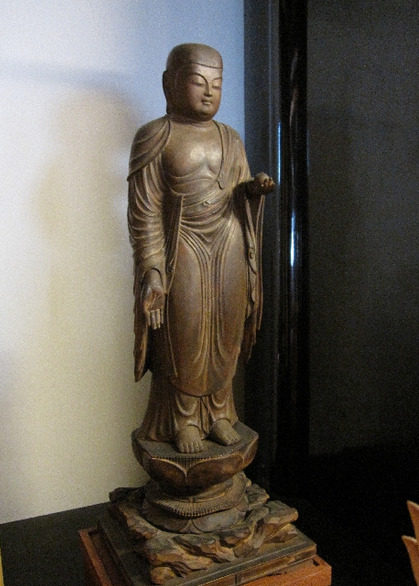
A statue of Nichira (amagasaki-daikakuji.com; reproduced here for educational purposes only)
Nichira is mentioned for the first time in the Nihon Shoki, in the section dedicated to the reign of emperor Bidatsu (late sixth century). He is described as an inhabitant of Baekje, one of the three Korean kingdoms which existed at the time. However, his father came there from Japan. The emperor seeks his help with navigating foreign policy. After some tribulations - apparently the king of Baekje didn’t want to let him go - he finally arrived in Japan in 583, armed and on horseback. He starts acting as an advisor to the emperor.
After a few months, Nichira is assassinated by other Baekje envoys present in the court since he wants the emperor to pursue rather aggressive foreign policy (most notably, he suggests ruthlessly slaughtering any potential settlers from Baekje who would try to establish settlements in Japan). The assassination has to be delayed, because he emits supernatural light at night. That’s not where his apparent supernatural powers end - after being killed he resurrects for a moment in order to make it clear his assassination was not a plot of Silla (another Korean kingdom). He is later buried, and no further mention is made of him.
While some elements of the Nihon Shoki account were retained in later legends about Nichira, especially his arrival from Korea and his ability to emit a supernatural glow, he was otherwise essentially entirely reinvented. Instead of an advisor of emperor Bidatsu, he came to be portrayed as a Buddhist monk and as an ally of prince Shotoku.
An early example of such a legend is preserved in Nihon Ōjō Gokuraku-ki (日本往生極楽記; “Japanese records of rebirth in a Pure Land”) from the late tenth century. It states that Nichira met with Shotoku when the latter was still a child, and declared he was a manifestation of Kannon. The prince in response recognized him as the reincarnation of one of his disciples from an unspecified past life. We also learn that he is capable of emitting light because of his devotion to Surya, the personification of the sun. There’s no real chronological issue here: while Nihon Shoki doesn’t mention Shotoku (or Buddhism, for that matter; it first comes up a year after Nichira’s death there) in any passages dealing with Nichira, the prince would indeed be a kid at the time of his arrival.
Things get more complicated later on. True to his portrayal as a ruthless enthusiast of military operations, Nichira came to be described as aiding Shotoku in quelling Mononobe no Moriya and his allies. Following the conventional chronology this would have happened long after Nichira’s death, though. A possible attempt at reconciling obviously contradictory traditions can be found in Ōe no Masafusa’s Honchō Shinsenden (本朝神仙伝), as you might remember from the Ten Desires post from last year.
In contrast with virtually every other source dealing with Shotoku’s genealogy, Masafusa claims the prince was a son of Bidatsu, which would make him considerably older at the time of Nichira’s arrival. The meeting between them is fairly similar to the Nihon Ōjō Gokuraku-ki version: Nichira recognizes Shotoku as a manifestation of Kannon, and both of them then emit supernatural light. No mention is made of any military help, though.
The portrayal of Nichira as a military ally of Shotoku is present in legends which link him with tengu. After the defeat of Moriya, he supposedly left to take over Mt. Atago. According to a guide to famous places (名所記, meishoki) from 1686, Kyōwarabe (京童; “Children in Kyoto”) by Kiun Nakagawa (中川喜雲; 1636-1705) he did so in the form of a tengu.
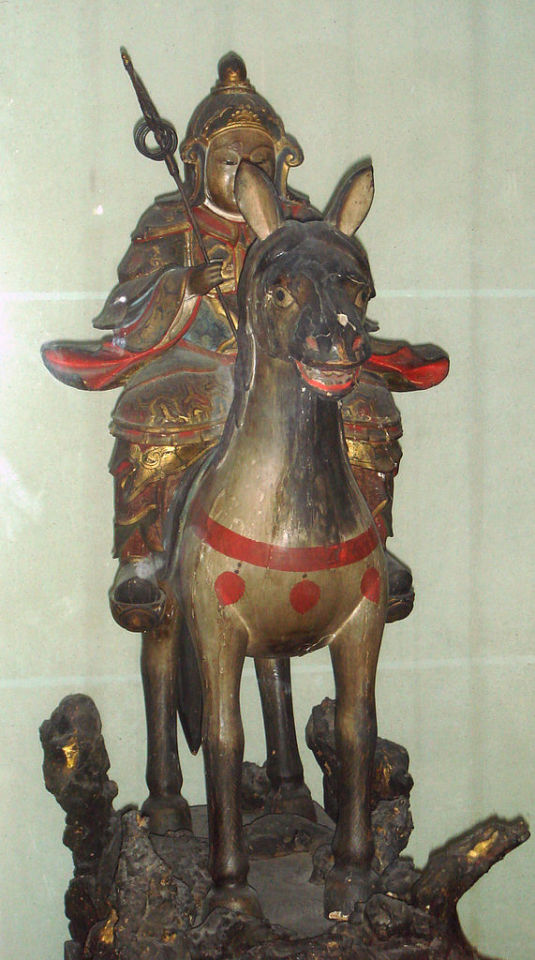
Atago Gongen (wikimedia commons)
Bernard Faure notes there is a similar legend in which Nichira is a separate figure from Tarōbō. The former, portrayed as a military official in the service of prince Shotoku, sets on a journey to pacify the tengu of Mt. Atago. He accomplishes this by revealing he is a manifestation of Shōgun Jizō (勝軍地蔵), a Kamakura period reinterpretation of this normally peaceful bodhisattva as a fearsome warrior, historically worshiped on Mt. Atago as Atago Gongen. Nichira then becomes the leader of the tengu, while Tarōbō provides him with information about the mountain.
Something that surprised me is that there is a single Korean source which mentions the tradition presenting Nichira as a monk who became a tengu. During the Imjin war, a failed Japanese invasion of Korea, the Korean Neo-Confucian philosopher Kang Hang was captured and subsequently spent three years (from 1597 to 1600) in Japan as a prisoner of war before escaping (possibly with the help of Seika Fujiwara, a fellow Neo-Confucian scholar he befriended). He wrote a memoir dealing with this experience, Kanyangnok (“The record of a shepherd”) in which he mentions Nichira in passing. He states that he was known as Tarōbō, and that he was enshrined and worshiped as Atago Gongen.
Something that’s worth pointing out is that despite living centuries apart, Ōe no Masafusa and Kang Hang both make the same mistake, stating that Illa arrived in Japan from Silla, as opposed to Baekje. I thought this might represent an alternative tradition, but in both cases translators pretty firmly conclude we’re dealing with a mistake. My best bet would be that this has something to do with the Japanese name of Silla, 新羅, sharing a kanji with Nichira’s own name; the name of Baekje, 百済, does not. It doesn’t seem any later legend brings up his post-mortem effort to clear the name of Silla envoys from the Nihon Shoki, so I don’t think that was necessarily a factor.
I’m actually shocked I haven’t seen a Touhou take on Nichira, considering his association with Shotoku. In particular, it’s worth pointing out that his transformation into a tengu is essentially how people tend to mistakenly assume the connection between Matarajin and Hata no Kawakatsu works (in reality, it’s very limited in scope and indirect, but that’s a topic for another time). Plus there’s a lot of storytelling potential in having a tengu - or even Tenma - be yet another character from Miko’s past. ZUN isn’t very interested in building upon prince Shotoku legends involving Kawakatsu or Kurokoma, but it’s hard to deny they’re a popular topic in fanart.
Yet another tradition about the identity of Tarobō, as far as I can tell entirely independent from his connection to Nichira, is preserved in the Engyōbon, the oldest version of Heike Monogatari. A gloss states that he is the tengu form of the monk Shinzei (真済; 800-860), who in a tale from Konjaku Monogatari and a variety of other sources menaced empress Somedono (染殿后; Fujiwara no Akirakeiko), the wife of emperor Seiwa.
Tarōbō also plays a role in a tale unrelated to speculation about his origin, Kuruma-zō Sōshi (車僧草紙; “Tale of the handcart priest”). It was originally composed in the sixteenth or seventeenth century. The eponymous protagonist is a Zen practitioner who, as his name indicates, travels with his handcart in tow. Tarōbō attempts to convince him to abandon this lifestyle. They engage in a Zen dialogue (mondō), in which the monk triumphs over the tengu. He also manages to overcome Tarōbō’s subordinates who attempt to make him stray away from his practice by showing him gruesome images of battles in the realm of the asuras.
Finally, under the name Nichirabō Tarōbō appears in the tale of Zegaibō. Initially I planned to only dedicate a single paragraph to it, but I figured Zegaibō is such a fun figure that a separate section is warranted.
Not a tiangou: Zegaibō, the Chinese tengu
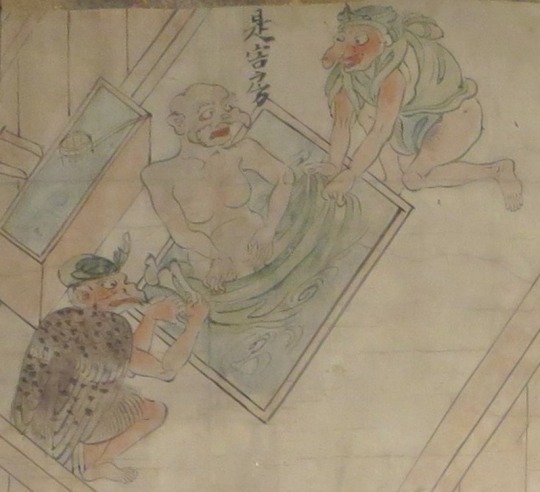
Zegaibō taking a bath (wikimedia commons)
The history of Zegaibō (是害坊) starts before he even got this name. In the anthology Konjaku Monogatari, there are a handful of stories about tengu arriving in Japan from overseas - specifically from India or China. These are obviously literary fiction, as there is nothing quite analogous to tengu in Indian literature, and while their name is borrowed from Chinese tiangou, this term also doesn’t have all that much to do with tengu, ultimately.
One of the aforementioned stories focuses on a Chinese tengu named Chira Yōju (智羅永寿; I was unable to establish whether there’s any connection with 智羅天狐, the alternate name of Iizuna Gongen, Chira Tenko) He arrives in Japan to challenge local Buddhist monks. He reveals that he has previously bested these in his homeland successfully, and that he would like to check how their Japanese peers compare. Local tengu take him to Mt. Hiei, where he unsuccessfully tries to bait major Tendai monks, including Ryōgen, into battling him. He is eventually beaten up by Ryōgen’s attendants, and after his defeat the Japanese tengu take him to a hot spring so that he can recover. In the end he decides to return home.
It was possible to establish that Chira Yōju was the basis for the tale of Zegaibō because the colophon of an illustrated scroll known simply as Zegaibō Emaki (是害坊絵巻) states that the story draws inspiration from a similar tale from the lost collection Uji Dainagon Monogatari. Based on other sources it is assumed it was most likely identical with the Konjaku Monogatari account of the misadventures of Chira Yōju. Save for the change of the main character’s name, the stories do not differ much. More time is dedicated to the meeting between Zegaibō and the Japanese tengu, though. They are led by Nichirabō from Mt. Atago.
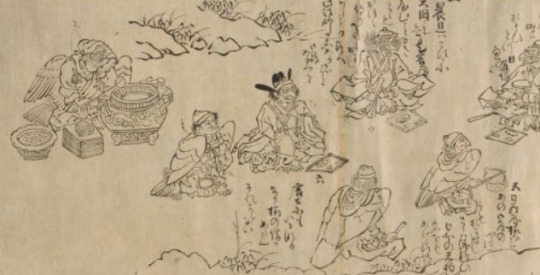
Zegaibō meeting with his Japanese peers (New York Public Library Digital Collections)
Zegaibō evidently became a popular, recognizable character later on. This might reflect a sense of patriotism (or nationalism) the story possibly could have inspired in the readers: the Japanese monks are portrayed as more resistant to the schemes of demons than their continental peers, after all. However, it’s also possible that Zegaibō’s defeat was interpreted as a take on tensions between Buddhist monks and shugenja, considering the latter were commonly compared with tengu.
Regardless of which interpretation is correct, Zegaibō’s undeniable popularity allowed him to reappear in a variety of other tales. There is a noh play which simply adapts the tale about him, Zegai. The events are largely the same, though the name Tarōbō is used instead of Nichirabō to refer to the tengu of Mt. Atago. Bernard Faure mentions that in one version of the legend about Nichira’s arrival on Mt. Atago, he defeats Zegaibō, here portrayed as the leader of the local tengu. The tengu subsequently reveals the “sacred geography” of Japan to him. Finally, Zegaibō plays a major role in the Edo period puppet play Shuten Dōji Wakazakari (酒呑童子若壮; “Shuten Dōji in the Prime of Youth”).
In this work, Zegaibō is indirectly responsible for the transformation of the eponymous character into an oni. After a rampage which left 160 monks dead and various other heinous acts, the young Shuten Dōji, known simply as Akudōmaru (悪童丸; “evil child”), proclaims that there has never been anyone more mighty than him in Japan, China or India. This display of arrogance alerts Zegaibō, who appears in the guise of a young monk and offers to wrestle with him so that he can prove his strength. However, as soon as the fight starts, he reveals his true form and takes Shuten Dōji into the air.
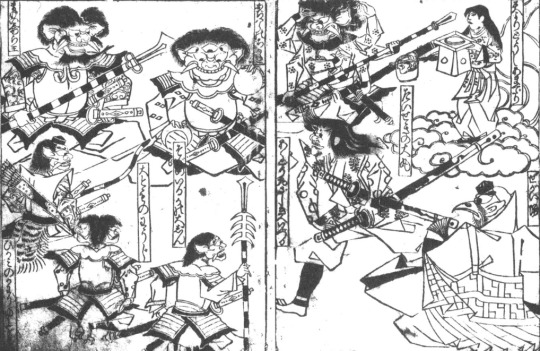
Zegaibō presents Akudōmaru to Maheśvara (via Keller Kimbrough's Battling Tengu, Battling Conceit; reproduced here for educational purposes only)
Zegaibō then brings his opponent to Maheśvara (摩醯首羅王, Makeishuraō; a phonetic transcription is used in place of the most common Japanese form 大自在天, Daijizaiten). The latter is unexpectedly described as a maō. Zegaibō seemingly presumes that his boss will punish the unruly human by turning him into a tengu, but Maheśvara is so impressed by his bravery that he chooses to turn him into an oni to let him cause even more chaos. This is rather obviously distinct from the more widespread versions I discussed in the not so distant past.
From makara to tengu: Konpira
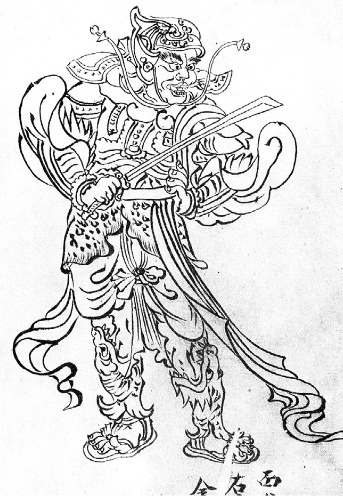
A typical depiction of Konpira as one of the heavenly generals (via Bernard Faure’s Rage and Ravage; reproduced here for educational purposes only)
While Zegaibō according to tales focused on him arrived from China, there is technically a tengu whose origins were believed to lie even further away - Konpira (金比羅). However, he is a special case because despite being arguably one of the most famous tengu, he actually wasn’t viewed as a member of this category for most of his history.
Konpira is a Japanese transliteration of Sanskrit Kumbhīra. This name can be literally translated as “crocodile”. His origin is poorly understood, though it is possible he was originally essentially a divine representation of reptilian inhabitants of the Ganges. As you can read here, the gharial, the mugger crocodile and the saltwater crocodile all can be found in this river in some capacity.
Fittingly, Kumbhīra is sometimes described as a makara who converted to Buddhism. This term refers to a type of partially crocodilian mythical hybrid, most notably depicted as the steed of Hindu deities such as Ganga and Varuna. Bernard Faure suggests that in Japan he might have been analogously understood as a wani at first. However, Kumbhīra could also be portrayed as a yaksha, for example in the Golden Light Sutra. What remained consistent is the idea that he was a fierce being converted to Buddhism.
Kumbhīra is well known as the foremost of the Twelve Heavenly Generals (十二神将, jūni shinshō). It is possible that the crocodilian Kumbhīra and the homonymous heavenly general were initially separate deities, though in Japanese context they are effectively the same. Konpira and his peers are regarded as the protectors of the Buddha Yakushi but historically were simultaneously perceived as a type of shikigami. I will only discuss this role more in my next article, though, as it is not very relevant here. All you need to know is that it made him a commonly invoked protective deity in apotropaic rituals.
An interesting legend pertaining to this aspect of Konpira’s character is preserved in the Taiheiki. When Fujiwara no Yasutada (藤原保忠; 890-936) fell ill, a Buddhist priest arrived to perform a ritual focused on Yakushi and his heavenly generals to heal him. However, as soon as he started to invoke Konpira, Yasutada got so horrified that he died. The ritual has apparently been hijacked through supernatural means, and what he heard was not the name “Konpira” but rather the phrase kubi kiran - “I’ll cut off your head”. This was an act of vengeance of the spirit of Sugawara no Michizane - Yasutada was one of the courtiers who conspired to exile him earlier. Evidently after he became a vengeful spirit he was able to essentially turn Konpira to his cause and reverse the effects of invoking him.
While the heavenly generals are associated with the Chinese zodiac, the correspondences between the individual deities and zodiacal animals aren’t really consistent. Konpira can variously be linked with the tiger, the rat or the boar, and accordingly with the northeast, north or northwest. The northeastern link is particularly significant, as in some cases it led to conflation between him and Matarajin, who as a subduer of demons was strongly associated with this direction.
A variant of the legend in which Saichō, the founder of Tendai, meets Matarajin during his journey to China identifies the latter with Konpira. Supposedly Konpira slash Matarajin was originally the protector of the Vulture Peak in India, then moved to Mount Tiantai in China, and finally reached Mount Hiei in Japan with Saichō.
The two were also equated with each other by the Tendai priest Jōin (乗因; 1682–1739) in the Edo period. However, his attempt was actually met with criticism from his contemporaries. A certain Sōji Mitsuan (密庵僧慈) wrote in 1806 that Jōin was evidently confused because Matarajin and Konpira are clearly separate deities. He concludes he evidently didn’t even read the Mahāvairocana Sutra. I’m honestly surprised ZUN didn’t reference this conflict over syncretism in any of Okina’s spell cards, it would fit right in.

Konpira Daigongen (wikimedia commons)
Despite Matarajin’s tengu credentials, which I discussed last month, the association between him and Konpira actually isn’t why the latter came to be seen as a tengu. This phenomenon instead began as an aspect of his role as the protective deity of Matsuo-ji on Mt. Zōzu (象頭山) in Shikoku. Here he came to be worshiped under the name Konpira Daigongen (金毘羅大権現). His enshrinement apparently only occurred in 1573, though according to a legend from the seventeenth century he arrived there much earlier, and already resided on Mt. Zōzu in the times of En no Gyōja. However, there is no reference to him in the few earlier sources dealing with this location. Since its name can be translated as “Mt. Elephant Head”, it has been suggested that it might have been associated with Shōten, the Japanese form of Ganesha, in earlier periods, though this remains speculative.
Despite Konpira’s new role as a mountain god, his early aquatic connections were not entirely lost. In the eighteenth century he came to be seen as a protector of maritime routes through the Seto Inland Sea and tutelary god of navigation. This reflected the growth of importance of inland maritime trade which was a result of the shogunate's ban on most foreign trade.
Interestingly, while most donations were made to Konpira by local sailors and merchants, his new role made him so famous that Chinese traders residing in Nagasaki prayed to him too, and a small shrine was even erected in that city at one point. Donations made by travelers from the Ryukyu Kingdom are recorded too. Both of these phenomena were highlighted in Edo travel books in order to stress the prestige of Konpira.
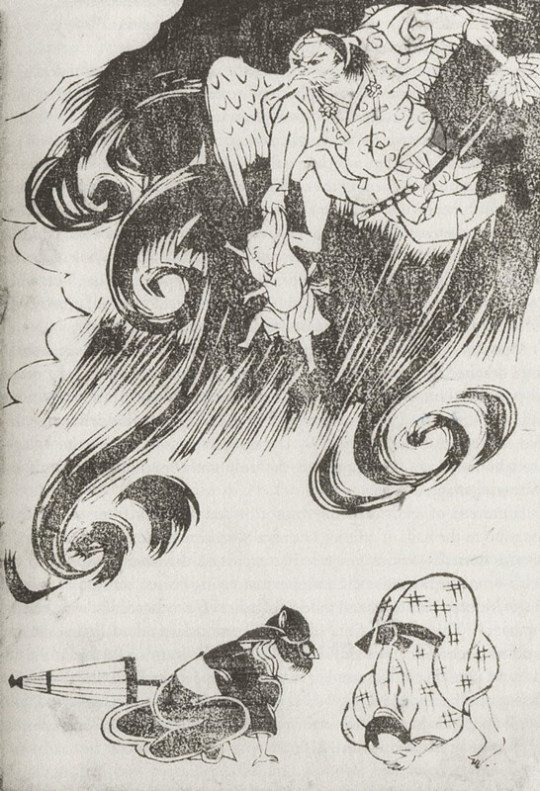
Kongōbō (Universität Wien's Religion in Japan: Ein digitales Handbuch)
Konpira didn’t become a tengu right away. The oldest recorded tradition associating Mt. Zōzu with a specific tengu refers to him as Kongōbō (金剛坊; “diamond priest”). He was not (yet) a form of Konpira, but rather a deified seventeenth century Shingon monk, Yūsei (宥盛), who between 1600 and 1613 served as the abbot of Matsuo-ji.
It seems Yūsei actually created the image of himself as a tengu on his own - in 1606 he commissioned a statue depicting him as a tengu manifestation of Fudo Myōō. The inscription explicitly states that he “entered the way of tengu” in order to bring fame to the mountain. This was a part of a bigger project of portraying himself as a master of various esoteric arts in order to gain the patronage of local nobles. After he passed away, his disciples and relatives continued spreading the image of his tengu form, now renamed Kongōbō. He eventually came to be seen as a manifestation of Konpira.
In popular imagination the new tengu-like image of Konpira eventually came to be detached from its actual origin. He was instead identified as emperor Sutoku simply because both were associated with roughly the same area - the historical Sanuki province. This idea was popularized by the 1756 play Konpira Gohonji Sutokuin Sanuki Denki (“The Sanuki Legend of the Retired Emperor Sutoku, the Original Source of Konpira”) by Izumo Takeda II. Various other authors followed in his footsteps, including Akinari Ueda and Bakin Takazawa, strengthening this equation.
While I focused on the early portrayal of Konpira and on his eventual transformations into a tengu, the traditions of Mt. Zōzu continued to evolve in subsequent centuries. After the separation of Buddhism and Shinto, Konpira came to be viewed as a kami. Due to the influence of Atsutane Hirata and his disciples he received a new name, Kotohira (金刀比羅) after the Meiji reforms. However, many lay people continued to refer to the protector of the mountain as Konpira. Today both forms of the name are in use.
Bibliography
Tumblr doesn't let me post the bibliography as a part of the article for some reason. You can find it here in the form of a google doc.
84 notes
·
View notes
Text
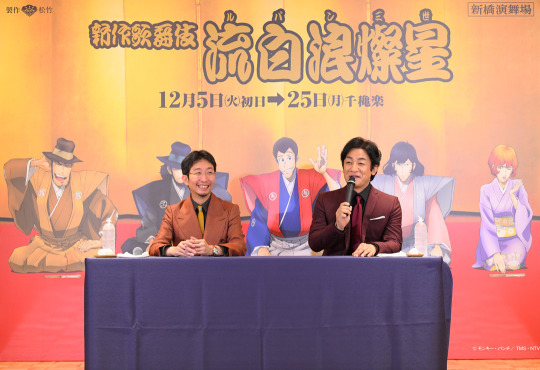
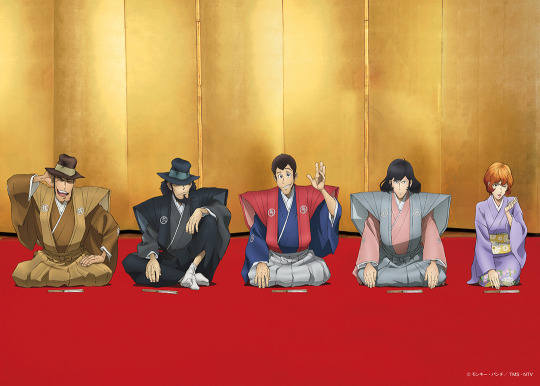
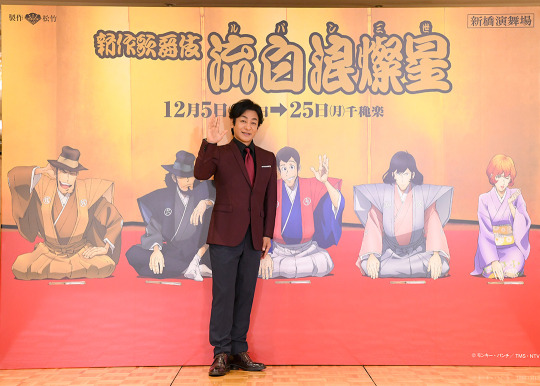
An interview took place in Tokyo this week with Kataoka Ainosuke VI, the actor who is set to play Lupin III in the upcoming Kabuki stage play, and Kazuhisa Tobe, the shows writer and director.
The pair answered a few questions, primarily about the show's storytelling and costumes. A new key art piece was also revealed, showcasing the anime versions of the main cast members in traditional attire.
100 notes
·
View notes
Text
number of unique chinese characters in a book
So there's this blog I read long ago on the number of unique chinese characters one uses. Say a person writes a 10k chinese novel. But how many characters are discrete?
Classical chinese poems and songs have me doubting my chinese ability as always, and that got me curious about how many chinese characters I know or write on a daily basis.
To answer this (and to very much knock my confidence like an idiot) I put together something to count the number of unique chinese characters in a passage. I use about... 2.8k characters in my general writing.
Then I wondered about the authors I read.
A quick search online suggests that a chinese user knows and uses 1000-3000 characters regularly, and after high school you are supposed to have taken in over 6000 characters -- something I'm pretty sure I didn't do.
That said, I got curious about the number of unique characters these authors I read usually use. That doesn't at all indicate writing competency, but well, it felt interesting regardless so I decided to go play with that a bit.
For reference, jinyong's wuxia novels are around 3.5k to 4.5k unique characters per novel.
you only need 2.5-3k characters to use chinese like natives do, it's not too much really!
methodology rambles feel free to skip to next heading
I recorded some numbers and figures for something to work with with works I enjoyed. Fanfics I also included, which I saved on my computer a long time ago.
I made attempts to analyse the data in a fairer way, looking at the total word count and the highest frequency of "的"s (a very common chinese particle, think the letter "e") used in the passage. That sort of helped, but at the same time there are always outliers that manage to muddle up understanding every single time.

So now, observations. I categorised them into four levels according to the number of unique characters, from lowest to highest.
observations
note: notable novels are highlighted in yellow for easy spotting, and fanfictions are shaded in grey. I added english titles for most of them because I didn't put them in when I first did the screencaptures.
first level: below 3.5k unique characters
Good authors don't always equate an extensive character set. Conversely, there are authors who basically cannot write well (subjective) and still end up with a surprisingly not-low unique character count.
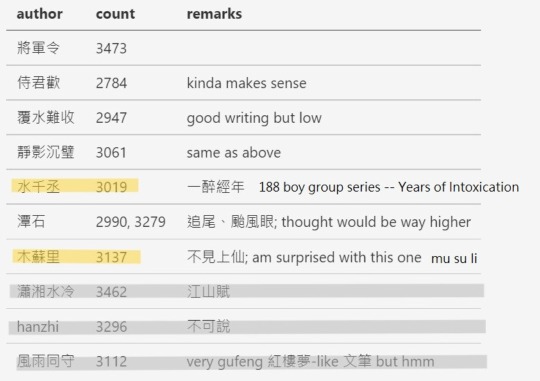
Works like 靜影沉璧、瀟湘水冷、風骨同守 that adopted a more literary, classical chinese writing register had lower unique character counts than the others. This was not what I expected, considering these works were where I found most words I'm unfamiliar with and ended up questioning my chinese reading ability (sorry lol).
I was also surprised with 潭石、水千丞、覆水難收、木蘇里 (mu su li) because their writing are all pretty good, all achieved while using a much smaller lexicon range than what I've expected.
(不問三九 with good writing was also low and in this range, but I forgot to mark hers down so, shrugs.)
second: 3.6k to 4.5k characters
That said, some authors do typically reach a range of around 3.6-3.7k unique characters, which is a pretty wide character set. Supposing adding a book of an author increases the total number of unique characters the author has used, these authors tend to round up at around 4k+ words with 2-4 novels inputted.
With each book added, there would be an increase of a few hundred unique characters, but they tend to level off at about 4.3k etc., and that is likely their maximum unique character count.
Some do level off at around 3.7k though, which indicates a narrower range of lexicon employed.
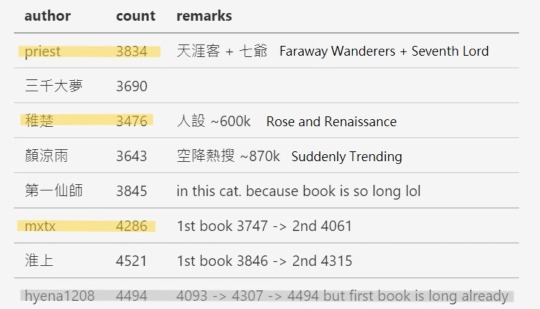
third level: the weird level
weird because the unique character count increases by leaps and bounds with every new novel of theirs that I added, and we end up perplexed and baffled.
At around 1M to 1.5M words inputted from an author, I thought that the unique character count would be pretty steady already, similar to how the unique character counts for authors at the second level levelled off eventually.
That's not the case for these two authors here. It is perplexing because the settings of their books do not vary greatly, yet the choice of characters and words were, apparently, diverse enough to give a "forever"-going increase in unique character count with every book I added.

This category aggravates me so much I couldn't make head and tail of it honestly lol.
the final level: the eloquent and literate
Of course, in this world there are always very literate individuals, and verbose they may seem, some are good writers. Here are the authors who actually have a vast unique character range.

You may be wondering how this 3.7k differs from the ones in the second level, but bear in mind this is merely the result from a single work of the author, or that the author's book is, like, half the length of the other authors while achieving a far higher unique character count than others.
And there's meatbun at the top of the list; I used both 2ha and Yu Wu for her stats, but her 2ha alone was already higher than Royal Nirvana and any other book I tested, so she goes in this category.
And et voila. All of this may not make sense to you, I'm not even sure about how the reception of this would be, it was a passion project and an interesting evening that I had, and now that I have some (sort of subjective) results I hope to share it out. :)
feel free to hmu for peculiar thought experiments and discussions on this topic!!
this is a repost from another site. i have used too many a username, and am not ready to link together all of them yet (someday) -- if you recognise this and wonder, message me, that's probably another account of mine.
#danmei#chinese language#mxtx#2ha#language#linguistics#meatbun doesn't eat meat#meatbun#chinese#cnovel#fate's wonky thoughts#fate creates
80 notes
·
View notes
Text
Mahiru's VA video transcript
[note I might TL this later, or someone else can, a lot of formal language is used so I'm not sure yet.
Anyway context: Okasaki Miho, Mahiru's actress, couldn't make it to the MILGRAM Live shows so she made a pre-recorded video apologising and answering some questions that played before both shows]
MILGRAM LIVE EVENT 「hallucination」をご観覧の看守の皆様
こんにちは、マヒル役の岡咲美保です!
はい、ということで
なんとMILGRAMがライブイベント開催ということで本当におめでとうございます!
岡咲ですね 今回、残念ながら出演できず
とても悔しい気持ちでいっぱいなんですけれども
今回、なんと こうして開演前の皆様見えておりますか?
皆様にコメントをさせていただける、ということで
大変嬉しく思っております!
はい、ということで
ご質問いただいているんですが
Q.マヒルを演じる上で印象に残っていること大切にしていることは?
ということでやっぱりこう、マヒルちゃんを最初にいただいた時の印象はすごくかわいらしくて幸せそうで、朗らかでっていうところだったんですけど状況が状況というかやっぱりこう罪を犯してしまっているっていうところがあったのでどういう、裏表じゃないですけどこの子何かちょっと違うぞっていう感触を皆さんに感じ取っていただけるだろう?っていうのはボイスコメントもそうなんですけどボイスのトレーラーだったりあと歌唱の時も何か一癖二癖感じていただけるようなエッセンスっていうのは毎回ディレクターさんだったり山田さんだったり、DECO*27さんだったりと色々と考えさせてマヒルちゃんを演じております
「愛に対する重み」みたいなものを特に意識しているので、皆さんに伝わっていたらいいなと思っております
はい、そして
Q.ファンの皆様へお伝えしたいことは?
ということで看守の皆さまをファンっていう一括りにするのもちょっと恐れ多いぐらい色んなことを、マヒルもですけど10人の囚人たちに対しても考えてくださっていていつもYouTubeのコメント欄だったりXの皆さんのつぶやきだったりを拝見していると
すごい、こんなところまでこの描写で感じ取ってくださってるんだ!なんて感激しております!言葉の上辺だけの意味じゃなくて色んなところまでマヒルを感じてくださっていつも感謝しております
これからのマヒルの動きだったりもぜひ注目して受け止めていただけると嬉しいなと思います今後ともMILGRAMをぜひよろしくお願いいたします!
はい、ということで
以上、マヒル役の岡咲美保でした!
このあとのライブイベントもぜひ楽しんでください!
よろしくお願いします
またね🎵
36 notes
·
View notes
Text
which blue lock character are you like quiz
you do things at your own pace
you're egocentric
you make plans early
you calmly deal with problems
you're full of curiosity
you're impatient
you're strong-willed
you're methodical
"I am number 1"
answers are all yes / no
#lemme kno if i misunderstood any questions#or well#they're not really questions its just statements but yea u get what i mean#blue lock#theres a lil desc for each chara but im not gonna try get all of them to translate it(
79 notes
·
View notes
Text
JLPT N2 grammar notes ~際(に)
~際(に)when; during
FORMAL
➡️~とき(公的な場面などで多く使う)
QUESTION:
( )祭、音が出る電子辞書は大変便利です。
A)発音が難しい b)発音がわからない c)発音を調べる
I originally said B 発音がわからない (not know pronunciation), because for me it made sense in the context of the sentence - when I don’t know pronunciation, an electronic kanji dictionary with sound output is extremely useful. However, grammatically this isn’t possible because 祭 can only be attached to the 辞書形 or た形 of verbs. You don’t attach it to negated verbs. Taking that into account, the answer that makes the most sense is C 発音を調べる (looking up pronunciation).
際(に)is mainly attached to verbs and nouns that represent actions (to use, to go out, to board, to complete). It is used often in official situations but not often for daily tasks.
こちらの会議室をご利用になる際は、受付で必要事項をご記入ください。(When you use this meeting room, please fill out the required forms at the reception.)
アメリカの大統領は来日した際に、私たちの大学でスピーチを行った。(When the U.S. President came to Japan, they gave a speech at my university.)
~の訪問の際に (during ~’s visit)
記者会見の際に (during the press conference)
A poster by Japan’s Ministry of Health encouraging people to wear masks when conversing (会話の際に): https://www.mhlw.go.jp/stf/newpage_14992.html
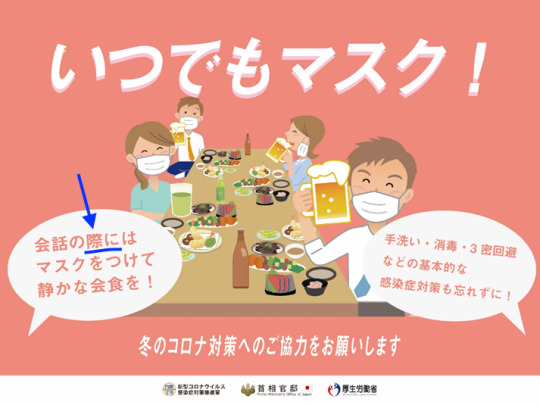
37 notes
·
View notes
Text
Homura answered my question about Kirari's spin-off. The original Japanese audio was very long, so I selected only the part where they answered Kirasaya and transcribed it using voice-to-text technology and used ChatGPT to translate it. Afterwords, to ensure better understanding, I also did some editing and added annotations. I hope you enjoy reading it.
Is it like saying you want to read a Kirari’s spin-off like Midari and Twin? Thank you very much. Kirari is great, right? You probably like the spiciness/ zing between the president and Sayaka, so if you do a Kirari spin-off, it's natural to come out at the end and you may have that kind of feeling. But when you think about it realistically, Kirari can't lose in the spin-off, right? That’s invincible in gambling. Writing about it wouldn't make much sense. So what to write? It might turn into a story where you just write about the lovey-dovey between Sayaka and Kirari. Indeed, it would be a difficult content to create.
Little by little, well, regarding Kirari to Sayaka, I have something to say.
In the spin-off novel that I wrote, I added their interactions with a sprinkle of trip and purification techniques, but particularly among women. (Note: It may refer to the scene where they washed each other's backs in the novel about hot springs)
I put my heart into it, of course, and thought about each characters, but I couldn't imagine what the president was thinking, so I couldn't grasp it. Well, I wrote a spin-off novel in which I put in a lot of Sayaka's interaction. Therefore, I thought about Sayaka and even put my heart into creating her lines. As a result, I became too emotionally invested in Sayaka and when she is involved in the main story, it becomes a bit painful. It's not that I don't want to see it, but it's just that my emotions while reading it become kind of...not unbearable, but sad. I don't like being tossed around so much, Kirari. Well, it's more like admiration for how difficult it is. Yeah, that's right.
How many other followers the president has. I say "followers," but there are probably many who are just not interested and cannot approach her. Do they love her? When you think about it, is Sayaka okay with just being there, considering other people's feelings? As a secretary, is it enough to just exist in that role? Well, I guess it's not easy to get noticed if your abilities aren't really high. Sayaka probably doesn't sleep much, and she's also studying. Oh, I remember something from a bonus novel I wrote. I think I described her as being really busy. No, she's definitely like that. I'm sure doing well in her studies, and she's the top in her club. In that case, it would be better for Sayaka to miss the perfect score. She probably arranges everything, like Kirari's lunch. That's definitely busy. If the president goes somewhere or has a meeting with someone, Sayaka will definitely follow her. As an assistant, she probably doesn't have much private time, right? So, if I were to categorize it, it would be interesting to do it from Sayaka's point of view. I might want to see it a little bit. If you want to read it, please contact Square Enix's Gangan Joker editorial department. So, that's about it for today, right?
Well then, instead of advertising, or rather as a way of promoting it, I just want to say that the way Kirari and Sayaka interpret 'this'. In the volume 6 of the main Kakegurui series called 'Tower of Doors' and this 'Perorin' thing. (Note: 'Perori' is an onomatopoeia expressing the sound of licking.) If you watch it, I think everyone who's interested has already seen Perorin. It was definitely shocking. As I mentioned before, it's Naomura-sensei ’s forest. (Note: Mr. Naomura is the illustrator of Kakegurui. I’m not sure about 'forest' It’s maybe referring to the field of lilies), so I was surprised too. It was like 'Pero' with a licking motion. It was quite the impact. There's also another 'Perorin', and even the second 'Perorin' seems to suggest something in the advertisement. But it might be too early. This is an advertisement saying that. Yes, that's right. Well, that's all for today. Thank you very much.
87 notes
·
View notes
Text
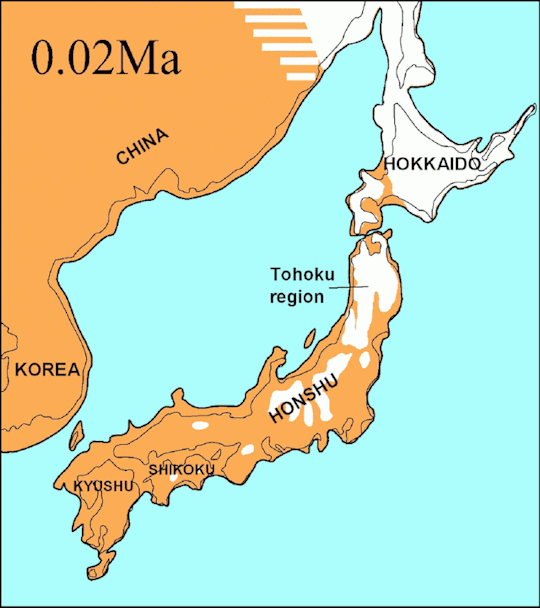

Capítulo 3: El origen de un país y su prehistoria, un paseo por la historia del país del sol naciente.
-
El Pleistoceno:
-
Sean bienvenidos, a una nueva serie, de arqueología prehistórica, en esta ocasión, nos trasladamos al país del sol naciente. En los capítulos anteriores hablamos de: ¿Cuándo llegaron por primera vez los homínidos a Japón? ¿De qué vivían?, hablamos algo de su geografía, aunque no todo lo que a mí me hubiera gustado, por eso en este episodio y en los venideros la iremos analizando y como conformó la prehistoria japonesa hasta su final, también comentamos el inicio de la prehistoria humana a nivel global y de los primeros humanos de africanos que hablamos de forma superficial, también hablamos de ¿Quiénes habitaban Japón cuando ellos llegaron? Y de ¿cuándo llegaron? Respondimos a las preguntas de forma sintética, en los siguientes capítulos hablaremos más de cada uno de ellos en profundidad, como es debido dicho esto pónganse cómodos que empezamos.
-
El pleistoceno fue un periodo glacial en el cual los casquetes polares eran enormes, no toda la tierra estaba cubierta como se ha hecho creer, había zonas con praderas, una vez aclarado esto damos paso a la geografía que la abordaremos unos cuantos episodios para entender mejor su historia, prehistoria entre otros temas.
-
Geografía nipona en la prehistoria:¿Cuándo se formó el archipiélago japonés? Hay dos teorías, la primera dice que lo más probable es que se formaran por partes cada una de las cuatro grandes islas y otra dice que salieron directamente de una sola formación, es decir, que las placas tectónicas en un solo sismo salieron las cuatro islas¿Qué opinan ustedes? Lo que sí se sabe es que hokkaido se formó de una tajada hace 20 millones de años, yo aporto una tercera teoría que hubiera pequeñas islas y que a raíz de lay se formará el resto de las islas, japón se sitúa en el cinturón de fuego, lo que lo convierte en un objetivo de las actividades volcánicas ¿Cómo se llaman las placas tectónicas que forman el archipiélago? Esta pregunta y muchas más la veremos en los próximos capítulos.
-
Vamos a dividir este capítulo en sus epígrafes para poder hablar de la geografía gracias por valorarlo.
-
第3章 国の成り立ちと先史、日出ずる国の歴史を歩く。 - 更新世: - 先史考古学の新しいシリーズへようこそ。この機会に、私たちは日出ずる国に移ります。 前の章では、ヒト科が初めて日本に到達したのはいつですか? 彼らは何を食べて暮らしていたのでしょうか?私たちは彼らの地理について少し話しましたが、私が望んでいたすべてではありませんでしたので、このエピソードと今後のエピソードではそれを分析し、それが終わりに至るまで日本の先史時代をどのように形作ったのか、また、古代の始まりについても説明します。世界レベルでの人類先史と、私たちが表面的に語る最初のアフリカ人についても話しますが、彼らが到着したとき、誰が日本に住んでいたのかについても話します。 そして彼らはいつ到着しましたか? 私たちは総合的な方法で質問に答えました。次の章では、それぞれの質問について詳しく説明します。言うまでもなく、安心して始めましょう。 - 更新世は、極冠が巨大だった氷河期で、信じられているように地球全体が覆われていたわけではなく、草原のある地域もありました。これが明らかになると、地理の問題に道が譲られます。これについては、いくつかのエピソードで取り上げます。その歴史、先史時代などのトピックをより深く理解するために。 - 先史時代の日本の地理: 日本列島はいつ形成されたか? 2つの理論があり、1つは4つの大きな島がそれぞれ部分的に形成された可能性が最も高いというもので、もう1つは単一の地層から直接生じたもの、つまり1回の地震でプレートが残ったものであるというもの���す。四島についてどう思いますか? 知られているのは、北海道は2000万年前に一片に形成されたということである。私は、小さな島々が存在し、その結果として残りの島々が形成されるだろうという3番目の理論を提供する。日本は火の輪の中に位置している。列島を形成するプレートを何というでしょう? この質問とさらに多くの質問を次の章で見ていきます。 - 地理についてお話しできるよう、この章をエピグラフに分割する予定です。ご評価いただきありがとうございます。
-
Chapter 3: The origin of a country and its prehistory, a walk through the history of the country of the rising sun.
The Pleistocene:
Welcome to a new series of prehistoric archeology, on this occasion, we move to the country of the rising sun. In the previous chapters we talked about: When did hominids first arrive in Japan? What did they live on? We talked a little about their geography, although not everything I would have liked, so in this episode and in future ones we will analyze it and how it shaped Japanese prehistory until its end, we also discuss the beginning of human prehistory at a global level and the first African humans that we talk about superficially, we also talk about Who inhabited Japan when they arrived? And when did they arrive? We answered the questions in a synthetic way, in the following chapters we will talk more about each of them in depth, as it should be said, make yourself comfortable and let's begin.
The Pleistocene was a glacial period in which the polar caps were enormous, not all the earth was covered as it has been believed, there were areas with grasslands, once this is clarified we give way to geography, which we will address in a few episodes to understand better. its history, prehistory among other topics.
Japanese geography in prehistory: When was the Japanese archipelago formed? There are two theories, the first says that it is most likely that each of the four large islands were formed in parts and the other says that they came out directly from a single formation, that is, that the tectonic plates in a single earthquake left the four islands. What do you think? What is known is that Hokkaido was formed in one slice 20 million years ago, I provide a third theory that there were small islands and that as a result of this the rest of the islands will be formed, Japan is located in the ring of fire , making it a target for volcanic activities. What are the tectonic plates that form the archipelago called? We will see this question and many more in the next chapters.
We are going to divide this chapter into its epigraphs to be able to talk about geography, thank you for valuing it.
#日本#history#japan#archeology#歴史#geography#prehistory#考古学#地理#先史時代#education#教育#culture#文化#ainu culture#アイヌ#pleistocene#更新世
22 notes
·
View notes
Note
what's something about your works that's often misunderstood? asking this because your stuff always has layers over layers over layers (COUGH dawn fowers COUGH) !!
THANK YEW FOR THIS WONDERFUL QUESTION! because i admit that sometimes, my everything and the flow get muddled up and confusing for the sake of the writing, and though i wanna pull the "it can be anything you want to be ><", nah.
but first of all a common misconception about frog in a well is that it's bnha-bashing. i admit, i don't like bnha at all but i wouldn't go as far as calling it bashing. and people always criticize froggie for nobara and megumi dissing the hell out of the hero community too much and to that, i say, shhh.
froggie is all about pacing and slow-build character development. nobara and megumi's characters are meant to be aggressive and confrontational and antagonizing at first because they're comparing their world to the other world, and the way they cope is through that. making themselves seem "better" than their peers give them a sort of safety because then, they aren't in danger, or are being threatened by the foreign world.
but of course, as we all know, as chapters passed, nobara and megumi get a character development. which is all froggie is about!
as for among dawn flowers (the face of god), i think this one has the most misconception because gojō is generally treated as an asshole there and yeah, he is, but i'd like to emphasize that while he is an asshole, the story is written in the reader's perspective. the explanation to gojō's actions are dictated by the reader, and we don't really get a proper gojō pov aside from the small snippet at the end which was barely a pov.
basically, i like writing vague stories with unreliable narrators so it's best to assume that not all that is written is what is actually going on.
19 notes
·
View notes
Text





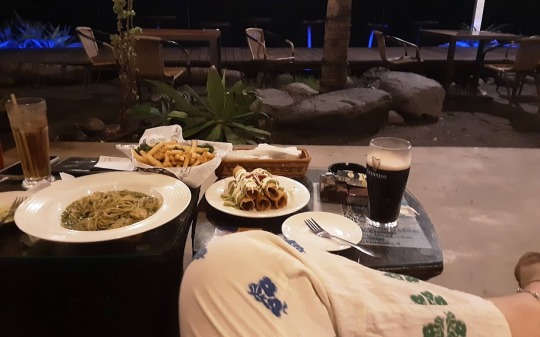
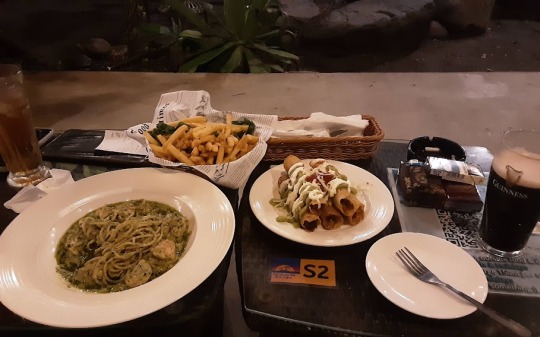

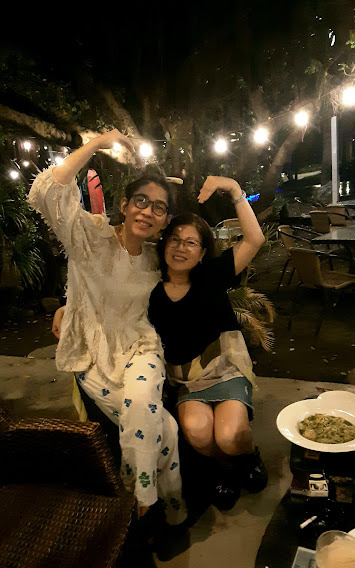
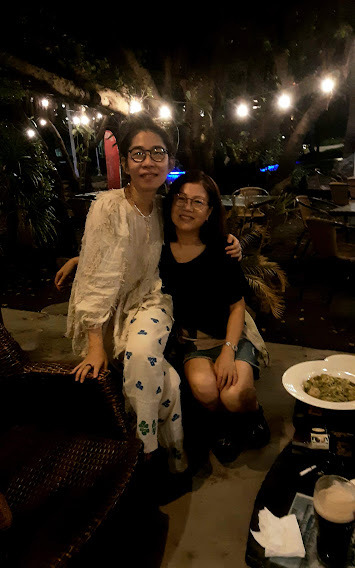
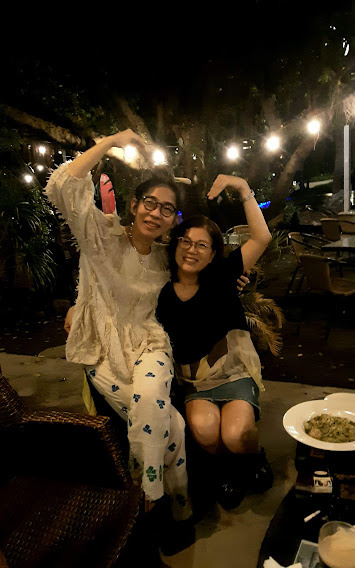

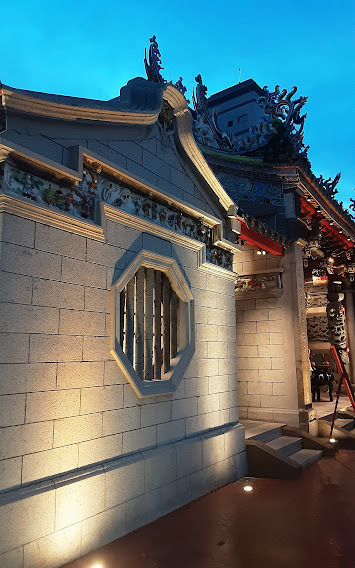
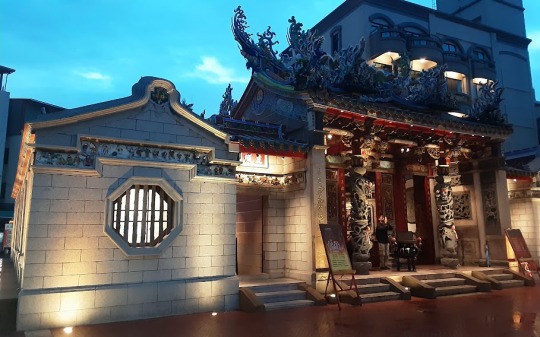

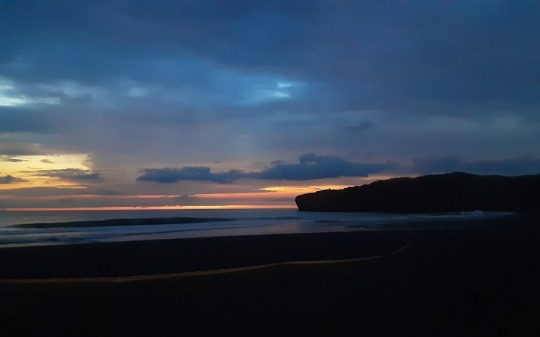
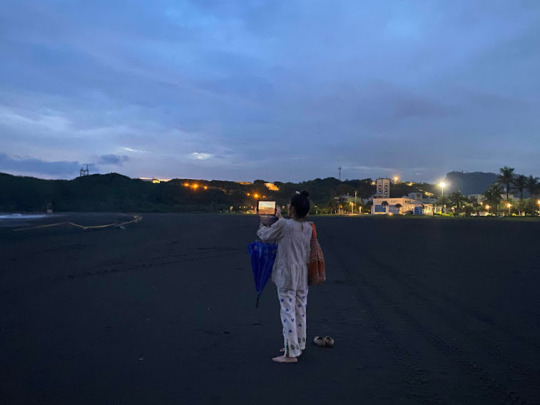

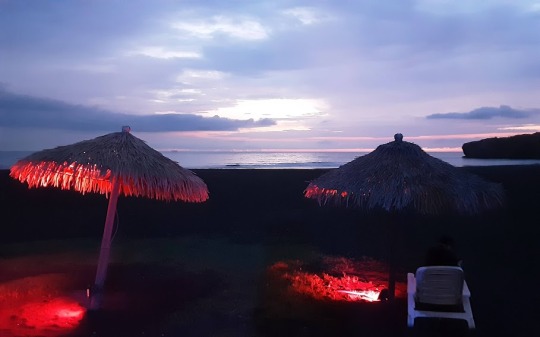

《 Part I 》玉芳姐回來看我 | Happy together again
She was top sellwoman in my old shop. I took care of her life at the time, We were both divorced due to domestic violence, she was homeless and I let her live in my studio, she very good in cry, 😅 you know I am who fears to see women's tears fallen. Alas! 😌 probably In my previous life, I was a man. 😜 Although she was 5 years older than me, I took good care of her, not because I needed her to help me make money only, but because of "empathy", we all fell and were hurt in marriage. She knows how to sell goods, which is her ability and professional strength, and I was lucky to have such an employee; anyway, we have experienced the ups and downs of life together; she lives in Taipei now, and she has a good life and is very successful. Every time she returns to Kaohsiung to be with her children, she will definitely remember to visit me; if someone asks me: What achievements have I made in life? Now I will probably answer: "Zero", but I have many "true" the best friends live all over the world, we've cried and laughed and given the best of ourselves, we've gone through life's dark times together, and when I blow the horn, they'll all come back as family. 🐕🦺 Lan~*
她是我老店裡的頂級女售貨員。 我照顧她的生活,我們倆人都因家暴而離婚,當時她無家可歸,而我就讓她住在我的工作室裡,她很愛哭 :D ,你知道我是個相當懼怕女人在我跟前哭的女人,唉!大概我的前世是一個男人。雖然她比我年長5歲但我很照顧她,不僅僅是因為我需要她幫我賺錢,而是基於"同理心",我們都曾在婚姻裡跌倒和受創。她很懂得銷售商品,這是她的能力和職業強項,我很幸運曾經有這樣的員工;總之我們共同經歷人生中的起伏;她現在住在台北,生活過得很好,很成功。每一次她回高雄與她的孩子相聚時,一定都會記得來看我;若有人問我:我的人生有甚麼成就?現在的我很可能會回答:「零」,不過我卻有許多『真正的』好朋友居住在世界各地,我們曾經一起哭過、笑過並且盡所能付出自己最好的部分,一起攜手度過人生的黑暗,只要我吹起號角,他們都會像家人一樣回來團聚。Lan~*
#chu lan#fine craft artist#朱蘭皮藝#leather art artist#beautiful life#strong friendship#高雄-旗津海邊#旗津海灘吧#live love laugh#eat live love#玉芳姐回來看我#happy together again
51 notes
·
View notes
Text
The Vicquisition, Translated
so, I keep going on and on about how I'm going to do a new, and revised translation of Phantom Of The G4, given that I am fluently bilingual in both Chinese and English. well, today I had the urge to translate... a certain segment of the game, both to see what I'm getting myself into, and to confirm the things I've heard it means for a certain character. that, of course, being my dearly beloved, Victor. specifically, his only appearance in POTG4 where he asks Vincent and Vanora a series of questions in order to let them pass deeper into the Myers facility.
I don't have the game itself, yet. because I abide by the rules to play VTSOM first. instead, I found a video of someone's playthrough of it - the audio is in Chinese, and not all dialogue options are covered. but in the meantime, this is quite a lot...
without further ado, my translation, notes and other commentary below the cut. Victor's lines are in red, Vincent's in purple, and Vanora's in pink.
想要我讓開很簡單。你只需要回答一些我的問題。
If you want me to make way, it’s very easy. You just need to answer some of my questions.
the player is given a yes/no prompt, and selects yes
很好。
Very good.
我們上次見面是什麼時候了,文森?
When was the last time we met, Vincent?
你以為我會記得這種事?真是自作多情。
You think that I’d remember this sort of thing? What wishful thinking.
(Note: The second sentence was a bit difficult to translate bc there’s several meanings to this phrase 自作多情 (literally "self-make-many-feelings"), from being overly sentimental to self-flattery/imagining yourself as everyone’s favourite person)
是這樣嗎?
Is that so?
難道你不記得你我引以為傲的那件事了?我們那時候到達的是任何人都無比渴求的巔峰。
Could it be that you don’t remember what we were so proud of? What we had reached then was a peak everyone had been longing for.
而你卻說過,財富、知識、榮耀…
And still, you have said: wealth, knowledge, glory...
player is given 3 options to finish his sentence:
是每個人都渴求的。 "… are what everyone longs for."
都毫無意義。 "… are completely and utterly meaningless."
不過是權力幾種類型。 "… are just various forms of power."
the player picks the second option
你這句話就已經背叛了���這裡的初衷了。
What you said here goes against your original intention to come here.
我隱約記得,文森·埃奇沃思從來不會後悔。
From what I vaguely remember, Vincent Edgeworth never, ever regrets.
最可怕的敵人,就是沒有堅強的信念。而能夠被輕易擊敗的人根本不配存在於這個世界上。
The scariest enemy, is to lack strong belief. And people who can be easily defeated are not worthy of existing upon this world.
he kills you with one smack of his metal hand. game over, go back to previous save…
this time the player picks the third option of above
而我們已經擁有了這些,甚至更多。
And we already had these, if not even more.
我們?別開玩笑了。
"We?" Stop joking around.
財富、知識、榮耀。沒有我哪一個你能保住?
Wealth, knowledge, glory. Without me, which one could you have kept?
沒記錯的話,你還因為此時欠在下一瓶酒。
If I’m not remembering wrong, you still owe me the next bottle of alcohol for this.
(Note: In Chinese, the word they use can both specifically refer to wine, and all kinds of alchohol in general.)
一如既往的自負,你還是嗜馬丁尼如命?
Conceited as always, and still so fond of/addicted to martini like your life depends on it?
(Note: Is the "addiction" literal or metaphorical? Maybe both? Truly we will never know.)
這還需要在下解釋?
Do I still have to explain this further?
的確,好的基酒對一杯馬丁尼十分重要。
Indeed, a good base spirit is essential for a martini.
3 dialogue options for the player again, all with the following structure:
所以我當然不會放過到手的頂級⋯。
"And so, of course I will always have some top tier [option below] on hand."
杜松子酒 gin
(Note: Literally "juniper berry wine" which I didn’t recognise at first bc usually I see it written as 琴酒 which reflects it phonetically)
白蘭地 brandy
伏特加 vodka
the player picks the third option
伏特加?你以為自己是在調製什麼?
Vodka? Just what do you think you are mixing here?
player gets two options to answer him with:
一杯血腥瑪麗。
A Bloody Mary.
一杯激情海岸。
A "Passion Coast".
(Note: I've done some rudimentary research on cocktails, but have never heard of something with a name like this. If anyone knows what this is, I'd appreciate the help. EDIT: a friend of mine on discord has informed me that it's most likely referring to the cocktail called Sex On The Beach)
player picks first option
血腥瑪麗?人道,「惟有經歷諸多苦難才能懂的苦難賦予你的意義」。
Bloody Mary? People say, "only by experiencing much suffering can you understand the meaning the suffering bestowed upon you."
虛假的苦難,虛假的血腥。這和你的過去比起來算什麼?
False suffering, false blood. How does this even compare to your past?
我親愛的文森,你都已經忘記了你所承受的一切嗎?那你的存在就沒有意義了嗎?
My dear Vincent, have you forgotten all that you’ve had to go through? And now your existence no longer has meaning?
he kills you, game over, go back to previous save
player picks vodka again and then second option of above
激情海岸?一向只喜歡乾身酒的你,怎麼可能喝這些果汁飲品呢。
Passion Coast? You’ve always only liked dry cocktails, how could you drink this kind of fruity/juice based beverage?
and again, he kills you. bro, stop judging people's taste in drinks 😭
player picks gin for the original question
這個自然。等我們從這個鬼地方出去,我給你便是。
Naturally. Once we get out of this damn/accursed place, I’ll give you some.
慢著,那件事指的是什麼?
Wait a second, what do you mean by "that thing/event/incident" ?
(Note: I take it she’s referring to the above "what we were so proud of" thing)
薇諾拉,「好奇心是大腦貪求的慾望」。慾念太強對身體可不好呢。
Vanora, curiosity is a desire the brain craves. And to desire for it too strongly is not good for the body.
看來你的這位同伴想知道的格外多呢。
Looks like this companion of yours knows quite a lot.
作為一名律師,我能做的僅僅只能讓人摒棄自己的信仰罷了。她的好奇心與我無關。
As a lawyer, all I can do is make people abandon their own beliefs. Her curiosity has nothing to do with me.
沒想到你也有無能為力的一天?
And you didn’t think you’d also have a day where you’d be powerless?
對方可是要以妨害執行公務的罪名將我逮捕呢,你說是吧,薇諾拉女士?
The other side/party wants to capture me for interfering with official duties. Isn’t that so, Miss/Lady Vanora?
哈哈哈。堂堂梅爾斯職業律師居然會因此害怕?
Hahaha. The dignified professional lawyer of Myers is scared of this?
再厲害也不過是一個俗人,出生起就已經被政府的一紙契約束縛著了。
No matter how mighty one is they are still a common person, already bound by a government contract at birth.
這麼說來,我突然想起你當年引用的一句話。不帶劍的契約不過是一紙空文…
What you said, suddenly reminds me of something you said back then. A contract without a sword, is simply a blank paper.
player is given 3 options now, to respond:
而政府的職責,便是化身為此劍。 And the government’s duty is to manifest as this sword.
它毫無力量去保障任何人的安全。 It has absolutely no power to protect anyone’s safety.
只有突破這本不存在的枷鎖,才能真正跳出羊圈。 Only by breaking these nonexistent shackles can one truly jump out of the sheepfold.
player picks the third option
跳出羊圈?真是荒謬。
"Jump out of the sheepfold?" How ridiculous.
有一些人的存在,是註定不能被救贖的。
Some people’s existences are doomed to never be redeemed.
and again he kills you, because dragon cult ahh belief
player picks the first option
…真是有趣的答案。
… what an interesting/funny answer.
(Note: Yes, in Chinese we use the same word for both of these)
不過我倒還記得一句話,地獄是太晚發覺的真相。那麼恭喜你獲得一張免費的地獄門票。
However, this reminds me of another saying, "hell is a truth/reality discovered too late." And so, congratulations on earning a free ticket to hell.
this time he isn't just killing you, he's SLAYING because holy shit if that isn't badass I don't know what is
player picks the remaining second option
話雖如此,你可是從來沒有怕過。
You say this, but you’ve never been afraid of it before.
我們都是遊走在劍鋒的人,這一點你沒資格說我。
We’re all people who walk on the point of a sword, you have no right to tell me this.
那你回到此地是為了什麼?
Then why did you come back to this place?
and again, 3 dialogue options for the player
任何東西都有一種特有的功能,某種工作或許只有它能做。 Everything has a unique function, and there are some jobs that only it can do.
無論這個漩渦有多令人絕望,我總是要走這一遭的。 No matter how hopeless this whirlpool/spiral/vortex will make me, I was always going to walk this path.
在下解釋過了是受人所迫。 I’ve explained that I was forced to do this.
player picks the third option
受人所迫?
"Forced?"
文森,任何人用這個藉口我都會半信半疑一下。至於你,我是絕對不會信的。
Vincent, everyone who uses this excuse, I will doubt (literally, "half-believe-half-suspect") for a moment. And in your case, I would never believe it.
and he kills you. we are so close to the end, yet so far…
player picks the first option, which becomes slightly modified for Vincent to say
任何東西都有一屬於它自己的功能。某種工作或許只有它能做,甚至比其他人更好。
Everything has its own function. There are some jobs that only it can do, sometimes better than other people, even.
真正的贏家只會讓這件東西為他所用,並讓他物超所值。弱肉強食,我只是不想看庸人螳臂擋車罷了。
True winners will only use this thing for their own ends, and give it an excellent value. The weak are meat and the strong eat, I just don’t want to see mediocre people biting off more than they can chew.
(Note: The phrase they used here, 螳臂擋車, literally translates to "a mantis using its arm to block a cart", meaning to underestimate what you’re taking on)
所以,請問你問完了嗎?你已經浪費了我太多的時間了。
So, may I please ask if you’re done asking? You’ve already wasted far too much of my time.
確實。你做的很好,文森。我想,我也沒什麼好多說的了。
Indeed. You did very well, Vincent. I think I don’t have anything more to say either.
he moves out of Vincent and Vanora’s way
那就祝你們好運了。
Then I wish you two good luck.
8 notes
·
View notes
Text
Vrelnir’s QA about Bailey & Eden (2)
伊甸和貝利年輕時會慶祝生日嗎?
When Eden and Bailey were younger, did they celebrate birthdays?
會。
Aye.
伊甸和貝利年輕時會如何慶祝他們的生日?他們會自己慶祝還是和朋友一起慶祝? 伊甸和貝利會送對方禮物嗎?
How would Eden and Bailey celebrate their birthdays when they were young?Will they celebrate by themselves or with friends? Will Eden and Bailey giveeach other gifts?
他們會和朋友一起慶祝,並且會送對方禮物。
They celebrated with friends, and gave each other gifts.
如果伊甸和PC在森林裡舉行婚禮,伊甸會邀請貝利參加嗎?
Eden and PC are holding a wedding in the forest. Will Eden invite Baileyto attend?
會。
Aye.
貝利會默許伊甸與PC的婚姻,還是會要求伊甸付更多錢? 抑或是貝利會等到PC還完所有欠債才同意他們的婚姻?
Will Bailey acquiesce to Eden's marriage to PC, or will he ask Eden to paymore money? Or is Bailey waiting until PC is completely free before Bailey willaccept it?
貝利會對伊甸提出要求,但不一定涉及金錢。
Bailey would make demands of Eden, and not necessarily involving money.
貝利會出席伊甸和PC的婚禮嗎?如果他會出席,他會在婚禮上做什麼?如果他不出席,原因是什麼?
Will Bailey attend the wedding of Eden and PC? What would Bailey do at thewedding if she would attend? If he won't participate, why?
貝利會出席。他會擔任伴郎或伴娘。
Bailey would attend. They'd be the best man or maid of honour.
貝利給伊甸送過什麼樣的生日禮物?伊甸又給貝利送過什麼樣的生日禮物?他們雙方對收到的禮物滿意嗎?
What birthday gifts did Bailey give to Eden? What birthday gifts did Edengive Bailey?Are both parties satisfied with the gift?
大多時候他們會互相贈送玩具或糖果。他們對收到的禮物很滿意。
They mostly gave each other toys or sweets. They were satisfied with thegifts.
如果PC在不擅長做家務時為伊甸做早餐,伊甸會皺起眉頭。那麽如果伊甸吃了貝利煮的飯,他也會皺起眉頭嗎?
PC will frown if he cooks breakfast for Eden when he is not good athousework. If Eden eats the rice cooked by Bailey, will he also frown?
會。伊甸不會喜歡貝利的料理。
Aye. Eden would not enjoy Bailey's cooking.
伊甸吃過貝利做的飯嗎?是在什麼情況下吃的?
Eden had a meal cooked by Bailey? Under what circumstances did you eat it?
是。過去有一段時間他們會輪流做飯。
Aye. There was a time when they took turns cooking.
貝利喜歡神祕人士送的聖誕禮物嗎?
Did Bailey like the Christmas gift from the mysterious man?
禮物讓他感到驚訝。
It surprised them.
(身體交換前提)如果PC(其實是貝利)遇到狂怒狀態時想帶PC回家的伊甸,PC(其實是貝利)會如何解決這件事?他會被帶回小屋並關在籠子裡嗎?If PC(actually Bailey) encounters the super angry Eden who wants to take him back,how will PC (actually Bailey) solve it?Or was he taken back to the hut andlocked in a cage?
他能讓伊甸相信他真的是貝利。
They'd be able to convince Eden they were really Bailey.
貝利有看過脾氣這麼差的伊甸嗎?
Has Bailey ever seen Eden with such a bad temper?
有。
Aye.
伊甸在什麼情況下會對貝利感到生氣?
In what situations would Eden be angry with Bailey?
在PC受到傷害的時候。
If harm came to the PC.
如果貝利長了一條狗尾巴,他會在什麼情況下看起來不耐煩、尾巴卻開心地搖晃?
If Bailey grows a dog tail, at what point will Bailey look impatient buthis tail will wag happily?
在PC誘惑他的時候。
If the PC seduces them.
除了伊甸以外,現在的貝利還有其他視為朋友的對象嗎?、
Besides Eden, does Bailey have anyone else they would consider a friendnow?
沒有,而他甚至連那一點都不會承認。
Nope, and they wouldn't admit to even that.
除了貝利以外,現在的伊甸還有其他視為朋友的對象嗎?
Besides Bailey, does Eden have anyone else they would consider a friendnow?
沒有,除非PC也算數。
Nope, unless the PC counts.
既然聖誕節要到了,我想偷偷問你貝利和伊甸現在還會交換禮物嗎?不論答案為何,如果他們現在必須交換禮物的話,他們會為對方準備什麼禮物?
Since Christmas is coming, I'd like to secretly ask if Bailey and Edenstill exchange gifts now? & Regardless of the answer, what would theyprepare if they had to exchange gifts with each other now?
貝利和伊甸現在仍然會交換禮物。伊甸會依靠他對貝利更加不為人所知的興趣的了解,贈送某些他在森林裡發現的有趣物事。貝利通常會送伊甸一本書和一些甜食。
Bailey and Eden still exchange gifts. Eden will give something interestingthey've found in the forest, as they know about Bailey's more esotericinterests. Bailey will usually give Eden a book, and some sweet food.
在PC和伊甸見面前,伊甸就已經擁有了一張PC的照片。那是貝利給他的嗎?伊甸是什麼時候得到它的?伊甸在那個當下就對照片裡的PC一見鍾情了嗎?Before pc and Eden met, Eden had a picture of pc. Did Bailey give itto them? When did Eden get it? Did Eden fall in love with pc in the picture atthat point?
對,是貝利給他的。
Aye, Bailey gave it to them.
貝利在聖誕節時收到的禮物是誰送的?是孤兒院裡的其中一名孤兒嗎?
Who gave Bailey a gift for Christmas? Is it one of the orphans in theorphanage?
我想為送禮物的人保密!這畢竟是一個聖誕奇蹟。
I'm happy to leave the one responsible for that gift a secret! It's aChristmas miracle, after all.
你認為貝利身上有什麼樣的味道?
What kind of scent do you think Bailey has on them?
貝利身上有淡淡的古龍水或香水味,偶爾還能聞到一絲香菸的味道。
Bailey smells faintly of cologne or perfume, with an occasional whiff ofcigarette smoke.
你先前說貝利不抽菸,那麼他在家時為什麼會叼著香菸呢?為什麼他的身上偶爾會有一絲香菸的味道?
I saw in the previous answer that Bailey does not smoke, so why does they have a cigarette in their mouth when they is at home? Why does their body with an occasional whiff of cigarette smoke?
他和會抽菸的人打交道,有時也會抽社交菸。They have dealings with smokers, and sometimes smoke socially.
既然伊甸會到城鎮裡尋找PC,有沒有機會讓PC帶他拜訪孤兒院,甚或跟貝利見面呢?我承認我只是想看到更多伊甸和貝利的互動!
Since Eden will come to town to look for PC, is there any chance that PC can take him to visit the orphanage or even meet Bailey? I admit I just want to see more of Eden's interactions with Bailey!
伊甸不會想在孤兒院和貝利見面。
Eden would not want to meet Bailey at the orphanage.
貝利對LI們有什麼看法?
What does Bailey think of all the LIs?
他認為羅賓需要吸取嚴厲的教訓,而惠特尼是個有用的蠢蛋。當他沒有和凱拉爾直接接觸時,他會忘記這個人。他沒有見過其他人。當然,除了伊甸,但那是後話了。
They think Robin needs to learn a hard lesson. They think Whitney is a useful idiot. They forget about Kylar when they're not directly engaged with them. They've never met the others. Except Eden of course, but that's a story for another day.
如果貝利要養狗的話,他會如何做選擇?他有什麼偏好或傾向嗎?他養狗的動機會是什麼?他會每天親自遛狗還是委託別人幫忙?
If Bailey were to get a dog, how would they choose one? Do they have any preferences or tendencies? And if they were to get a dog, what would be their motivation? Would they walk the dog themselves every day, or would they delegate that to someone else?
他會想要一隻忠誠、聰明,並且能成為一個有用的好夥伴的狗。他偏好看起來很嚇人的那種狗。他很有可能會每天親自遛狗。
They'd want a loyal and intelligent dog that would make a good and useful companion. Preferably something that looks intimidating. They'd likely walk it themselves every day.
貝利對哈珀、伊甸、雷米和奎因有什麼看法?
What are Bailey’s thoughts on Harper, Eden, Remy, and Quinn?
貝利並不算真的認識哈珀,他痛恨雷米和奎因,並且對伊甸的感情很複雜。Bailey doesn't really know Harper, hates Remy and Quinn, and has complex feelings about Eden.
貝利在學時通常都會做些什麼事呢?他除了讀書以外還會進行什麼活動?他在學時曾建構起自己的影響力嗎?他最喜歡的科目是什麼?或是有沒有一項他格外感興趣或認為最實用的科目?另一方面,伊甸的校園生活呢?
What did Bailey usually do back when he was a student in school? Besides studying, what other activities was he involved in? Did he develop any influence within the school? Did he have a favorite subject, something he was particularly interested in, or found most practical? On the other hand, what was Eden's campus life like?
貝利在學時的成績很好,尤其擅長數學。他相當受歡迎,有時有霸凌人的行為,但他很保護朋友。
Bailey did well at school, particularly in maths, and were fairly popular. They were a bit of a bully, but protective of their friends.
伊甸有點獨來獨往。他有時候會遭遇霸凌,但他的耐受力很高*,而且有一小群會照顧他的朋友。他的成績很好,但在後期略有下滑。(註:Thick skin原意「因習以為常而變得不在乎他人的批評」,可以解作較中性版本的厚臉皮。近似詞為冷淡、麻木)
Eden was a bit of a loner. They were sometimes bullied, but had thick skin, and a small circle of friends who looked out for them. Their grades were good, but deteriorated towards the end.
如果伊甸知道PC入獄了,他會去監獄拯救PC嗎?
If Eden knew that PC was in the prison, would they go to the prison to rescue PC?
他會聯絡貝利,而貝利會向他保證情況已經得到控制。
They would contact Bailey, who would reassure them that the situation was under control.
貝利和伊甸曾經發生過爭執、意見分歧或衝突嗎?如果有的話,你可以透露背後的原因嗎?Has Bailey ever had arguments, disagreements, or disputes with Eden? If so, can you reveal the reasons behind them?
有,關於這點會在日後探討。
Yes, and it'll be explored in the future.
伊甸曾經出於任何目的進入過孤兒院嗎?如果有的話,他拜訪的原因是什麼?他對孤兒院的又是怎麼想的?貝利的影響力是否曾經牽動他的觀點?
Has Eden ever entered the orphanage for any purpose? If they have, what was the reason for their visit, and what are their thoughts about the orphanage? Has Bailey’s influence affected their views?
有,這點也會在日後探討。
Yes, and this will also be explored in the future.
貝利對伊甸是怎麼想的?貝利對伊甸的看法是否曾隨時間產生變化?是變得更加正面還是更加負面?
What does Bailey think of Eden? Has Bailey’s opinion of Eden changed over time, becoming more positive or negative?
貝利對伊甸的看法隨時間產生了變化,這點會在日後探討。
Bailey's thoughts on Eden have changed over time, and will be explored in the future.
貝利有任何親近的朋友嗎?他如何看待友誼?既然他對發展親密關係有障礙,我很好奇他是否僅僅將友誼當作達到目的的手段。那樣的話他會很孤單的。
Does Bailey have any close friends? How does they view the concept of friendship? Since they has difficulty forming intimate relationships with people, I wonder if they sees friendship as a means to an end. But that would be quite lonely.
他沒有親近的朋友,但他有老朋友。
They have no close friends, but they have old friends.
誰是DoL最強的角色?
Which Dol character is the strongest out of everyone?
伊甸是最強大的個體,但貝利擁有最大的權力。
Eden is the strongest individual, but Bailey is the most powerful.
如果伊甸住在森林裡,他是怎麼跟貝利聯繫的?
If Eden lives in the forest, what is their way of communicating with Bailey?
他們在一個特定的地點互相留下訊息。
They leaves messages for each other in a particular place.
我在之前的Q&A看到你說一個和貝利有關的蛇紋圖樣會被加入遊戲,所以我想問貝利和蛇的意象是否存在聯繫?(你只需要說是或否,拜託,這對我來說真的很重要)
I saw in your previous Q&A that the snake pattern related to Bailey will be added in the future, so I am curious if there is some connection between the image of the snake and Bailey? (All you have to do is say yes or no,Please, this is really important to me.)
貝利和蛇的意象存在聯繫。
There is a connection between Bailey and snake imagery.
貝利將伊甸視為朋友嗎?
Does Bailey view Eden as a friend?
是。
Aye.
伊甸和貝利誰比較高?
Which one is taller, Eden or Bailey?
伊甸。
Eden.
貝利的刺青上有什麼圖案?
What's on Bailey's tattoo?
一條蛇。
A snake.
貝利周圍的人對他有什麼想法?
What do people around Bailey think of them?
大多數人都覺得他是一名善良正直的好公民,其他人則畏懼他。
Most people think they're a good and wholesome citizen. Others are afraid of them
除了伊甸以外,貝利在學時和其他人有過關係嗎(包含浪漫關係)?
Who else besides Eden had a relationship(include romantic) with Bailey when he was in school?
沒有其他命名角色和貝利關係親近。
None of the other named NPCs had a close relationship with Bailey.
貝利把PC賣給伊甸的時候,他怎麼有辦法和伊甸保證PC會被綁在那裡等他?伊甸和貝利在此之外有其他互動嗎?
Hey Vrel! I'm curious: when Bailey sells the PC to Eden, how on earth do they get word to Eden that PC will be waiting tied for them? Do Eden and Bailey interact outside of that, too? Thank you!
伊甸和贝利的确会在那个地方之外互动,不过极少。
Eden and Bailey do interact outside that, though scarcely.
貝利和伊甸發生過*關係嗎?
Did Bailey have s*x with Eden?
貝利和伊甸沒有發生過*關係。
Bailey and Eden have not had s*x.
伊甸的收入從何而來?我很好奇他怎麼有足夠的金錢向貝利購買PC。
How does Eden make income? Curious how they can afford to buy PC from Bailey.
狩獵。
Hunting.
伊甸跟貝利在交易PC以外的地方有其他聯繫嗎?
Do Eden and Bailey have any connection outside of buying/selling the PC?
有。
Aye.
貝利有任何重視或珍惜的人嗎?我所能想到他唯一重視的事物就是金錢。
Is there anyone Bailey respects or cherishes?The only thing I can think of that they hold dear is money.
他在某種層面上重視著伊甸。
They respect Eden, in a way.
在聖誕節劇情中,貝利也得到了一份禮物。我很好奇送他禮物的人究竟是誰。PC似乎會毫不猶豫地送他禮物,但遊戲中並沒有提供為貝利購買禮物的選項。又或許是羅賓送他的?我相信他是最有可能這麼做的人了。貝利收到禮物時的心情如何?他後來又是如何對待那份禮物的?什麼樣的禮物會讓貝利感到開心呢?
In the Christmas storyline, Bailey also received a gift. I’ve always been curious about who gave him the gift. It seems that the PC would not hesitate to give him a gift, but the game does not offer the option to buy a gift for Bailey. Or perhaps it was given by Robin? I believe he’s the most likely person to do so. How did Bailey feel upon receiving the gift, and how did he subsequently treat it? And what kind of gifts would make Bailey happy?
我想為送禮者保密。至於最後一個問題,伊甸和一些貝利的打手會知道貝利喜歡什麼樣的禮物,關於這點日後有可能會探討。
I want to leave the one responsible for the gift a secret. As for gifts Bailey would like, Eden and some of Bailey's goons would know. It might be explored in the future.
伊甸曾經背叛過貝利嗎?他們的關係看起來很親近,卻又在某種層面上顯得有些複雜。
Has Eden ever betrayed Bailey? Because their relationship looks quite close, but somewhat complex on some level.
從貝利的觀點來看,是的。
From Bailey's perspective, yes.
假如伊甸抓到贝利和PC在做一些羞羞的事情,伊甸会怎么做?贝利会怎么做?
If Eden caught PC and Bailey doing adult thing, what will Eden do and what Bailey will do too?
伊甸会感到惊讶,目瞪口呆,立刻离开。贝利会对自己感到生气。
A: Eden would be shocked and appalled, and leave at once. Bailey would be angry with themselves.
source:Vrel’s Q&A (notion.site)
19 notes
·
View notes
Note
I was instructed by a mutual friend of ours to seek you out for some council, Lord van Zieks. I'm sorry for the questions I am going to ask, and I want it to be known that you do not have to answer if you don't feel comfortable.
How do you deal with family members who are not proud of you despite the feats that you achieved?
このメッセージの次のセクションの無礼をお許しください、主よ。
すさとさんとの話し方を後悔してますか? 私との話し方を後悔していますか? カズマさんの扱いは上手ですか? あなたが受け継いだのと同じ敬意を彼も受けていますか?
Once again, pray forgive the discourtesy of my rudeness, but I had to let it out. My sincerest apologies.
[@ryunosuke-naruhodo-blog]
I saw that exchange, yes. I would hardly call him a "friend" of mine. He has yet to enlighten me as to whatever favour he wishes to ask of me, yet he has gladly divulged the fact that I grasp your language to anyone who will listen.
... それでは。 明らかな誤りがございましたら、どうかお許しを。実に十年ぶりの練習でございますので。
成歩堂氏、貴殿はご両親の行動の負担を自らの肩に担うべきではございません。その責任は彼ら自身が負うべきものです。言われたことは受け入れ、自分の感情が何であれ、それが正当であることを認めるのみです。もし貴殿の家族が貴殿を受け入れないのであれば、少なくとも自己受容を願います。
当然、貴殿や貴殿の法律助手に対する私の言動に誇りは持っておりません。私の両者に対する評価は誤った根拠に基づいておりましたし、私の弟子に関しても同様です。彼に敬意を払っているかどうかについては、私が決めることではないでしょうね。彼自身がこのやり取りを読むことでしょうから、彼の感情を誤って代弁する不名誉は避けたいと思います。
何故... この問に私に問うのでございますか?
12 notes
·
View notes